#good thing for her her society has a president instead of a prime minister
Explore tagged Tumblr posts
Text

Jacques Delors, president of the European Commission during its most imperial and self-confident years, unwittingly became the Gallic symbol to British eurosceptiques of all they feared and despised about the great European project. This perplexed but did not faze him, especially given that after his departure the structure and aims of the European Union remained much as he had envisaged them during his decade from 1985 in Brussels. Appointed to a record three terms as president, he has claims to be the most significant architect and leader of the European project since its emergence following the second world war.
The irony was that the great achievement of Delors, who has died aged 98, was the creation of a single regulated market for trade, goods and services across the European Union – an idea that Margaret Thatcher, his nemesis, enthusiastically signed up to. However, he wanted to go much further than her and some other European leaders, seeing the concomitant need for a single currency and a more powerful, centralised federalist governing system in a global economy with competing power blocs: “National sovereignty no longer means much. . . voluntary cooperation never works,” he said. “In order to face American and Japanese challenges we need to be supranational” – this before the rise of China as an economic power.
Delors, with his lower middle-class background, his ferocious work ethic, his strong religious faith allied to an economist’s belief in fiscal restraint and anti-inflationary caution, might have been a natural ally of Conservative prime ministers. Thatcher backed his appointment to the commission in 1984, and his subsequent reappointment. But his very Frenchness – his strong accent, his pinched and somewhat rancorous manner, and his Gallic confidence in centralised government – counted against him as the tide of popular opinion on both sides of the Channel started to turn in reaction to economic downturn, job insecurity and rising unemployment. Certainly national governments made sure that no commission president would ever be so powerful again.
What was remarkable was that Delors did not come from the privileged French elite of énarques, graduates of the École Nationale d’Administration, whose expectation is that they will run things, or from a powerful party political powerbase, but had fought his way up through ability, application and hard work. The only child of Jeanne (nee Rigal) and Louis Delors, a grievously wounded veteran of the first world war who had left the rural region of Corrèze in south-central France to become a messenger at the Banque de France in Paris, Jacques was born in the working-class 11th arrondissement of the French capital.
His background – half respectable urban poor, half self-reliant rural peasant – did not turn him into a socialist but encouraged him to become a member of the Jeunesse Ouvrière Chrétienne (the Young Christian Workers) movement (and an able member of its basketball team). Delors’ devout Catholic faith shaped his politics, and although he became a member of the French Socialist party in the 1970s he said later: “I’ve never been fascinated by communism and Marxism – I am undoubtedly the only man on the French left who never has been. I believed one could improve society but not change society.” It was his Catholicism that fuelled his support for collective social responsibility and co-operation.
His education was disrupted by the second world war, and afterwards he was diverted from going to university by his father’s insistence that he should follow him into the Banque de France. Otherwise, he might have become a fashion designer, film director or sports journalist. Instead he worked as a securities manager, studied economics at evening classes and married another staff member, Marie Lephaille, who was of Basque origin, in 1948. The bank wanted to promote him, but in 1953 he accepted a job as an economist with a Christian trade union that appreciated his skill at explaining economic concepts clearly. When, years later, François Mitterrand asked him how he had acquired that skill, Delors replied: “If I am clear, it is because I have had little education. As I am not clever, before understanding something I have to make a huge effort.”
By the late 1960s that fluency and seriousness had taken him into politics, as an adviser to the Gaullist government and then into the Socialist party, tempering its secularism. Under Mitterand he became the government’s economics minister (1981-84), gaining the reputation of saving France from financial meltdown by reining in the socialists’ wildly unrealistic spending policies, curbing inflation and cutting the ballooning budget deficit, despite Mitterand’s cynical havering and the outright opposition of most of his fellow ministers.
He impressed European finance ministers and even eventually the sceptical Mitterand, though not enough to be made prime minister: “Delors,” said the president, “smells of the sacristy.” Instead, when there was a vacancy for the presidency of the commission, he was put up for that job as the acceptable French face of economic realism for leaders such as the German chancellor Helmut Kohl and Thatcher.
The commission, once described as a civil service with attitude (not only administering community policies but proposing and implementing its rules and regulations), was in a state of complacent near-torpor when Delors arrived in January 1985. Within a fortnight, following consultations with national governments, he shook things up with the announcement of plans to launch a European single market over the coming seven years, removing trading barriers and discrimination against foreign competitors. Stasis in decision-making in Brussels was countered by reducing countries’ vetoing powers. In constructing the single market he would have the enthusiastic support of the British Tory internal market, tax and customs commissioner Lord (Arthur) Cockfield.
More clearly than leaders such as Thatcher, who thought of it merely as a freeing up of markets, Delors saw the implications for states’ social and employment policies and, eventually, currencies as well: alarm bells rang when he announced that within a decade 80% of economic legislation, including taxation and social policy, would come from the commission. The single market was, certainly initially, a means of stopping Europe’s relative economic decline in the world, but it would also have wider international benefits. He told the European parliament that the member states would have to learn “to speak with a single voice and act together”, and added: “Are we Europeans capable of it? Whether it concerns currency instability, prohibitive rates of interest, hidden protectionism, a decline in aid to the poorest countries – no, Europe has not known how to lead the way.”
Under Delors, the commission became more forceful and outspoken, but also more tightly governed by the president’s cabinet coterie of mainly French staff. They – like him, but unlike many others in the commission – had a Stakhanovite work ethic and an arrogance in enforcing the president’s will across its departments.
Delors thought of himself as an internationalist, with a penchant for jazz and American films, but he was little travelled and struggled to appreciate national foibles and political differences. His strong French accent when speaking English and his austere and unsmiling appearance seemed to typify the arrogant European bureaucrat to the British tabloids, increasingly adopting the sceptical tone of the Thatcher government. He was wily but also outspoken, not always choosing his words carefully or respecting sensitivities.
In 1988 he told the TUC Congress that the commission would require governments to introduce pro-labour legislation, including a right to training and improved protection for workers. That swung the British left and the trade unions almost overnight in favour of Europe as a bulwark against Thatcherism, but it naturally infuriated the prime minister, who retaliated with a speech in Bruges. “We have not successfully rolled back the frontiers of the state in Britain only to see them reimposed at a European level with a European superstate exercising a new dominance from Brussels,” she said.
Thus was a new Tory trope born, gradually replacing the party’s previous pro-Europeanism, though two years later Thatcher’s “No! No! No!” to Delors and federalism in the Commons was what precipitated her downfall. More demotically, “Up Yours Delors!” was the Sun’s headline response, reflective of a growing identification of the commission president with the ills of Europe.
By the early 1990s, with the single market in place, Delors’ plans for the next stage – the single currency and political union – were causing consternation among voters in other countries besides Britain. His perceived stubbornness was exemplified when he attempted to derail a deal on farm subsidies with the US, holding up a world trade agreement, because he believed it would undercut French agriculture. The commission’s pre-emptive announcements across a range of issues fed into a wider perception of its indifference to national preferences and democratic decisions.
This came to a head with the Maastricht Treaty of 1992, which – over 250 convoluted and constipated pages – outlined the creation of the European Union, explained new modes of governance within it, and detailed steps towards the adoption of the euro through the creation of the European Monetary System. Its passage through the member states, in legislatures and referendums, was fraught: it nearly brought down John Major’s government in the UK, was initially rejected by the Danes, and was only endorsed by the narrowest of margins by the French. The treaty became a symbol of an out-of-touch bureaucracy and commission president, both unable to connect with or explain to Europe’s voters either why the changes were necessary or what their benefits would be.
Delors’ infuriated statements, such as in a speech in Quimper, Brittany, where he asserted that “there’s no place in a democracy for people who call for a non,” only fuelled the mainly rightwing campaigns against the treaty and created resentment about Europe’s creeping interference in national democratic procedures.
Nevertheless, the treaty eventually passed. Delors had wrestled Europe into a new, more unified and federal direction, with the new states of eastern Europe queueing up to join. However, the treaty was also the harbinger of growing difficulties to come, especially as the single currency intially faltered in the following decade.
Delors, by then the longest serving president in the commission’s history, seemed to recognise that his time was now over. “I became the symbol of an idea of Europe which is in the process of vanishing,” he said in December 1993. “I am discouraged to the extent that I can no longer be useful. I can no longer stamp my mark on Europe. It’s finished [and] frankly, I am no longer the man for the job.”
It was assumed that when Delors stepped down from the presidency in 1995 that he would resume a political career in France, perhaps as a socialist candidate for the presidency. But it was not to be. The French elected the Gaullist Jacques Chirac to succeed Mitterrand, and by then Delors was anyway touching 70 and troubled by sciatica. In the EU, the heads of government had had enough of an overweening, over-ambitious commission and replaced Delors with the ineffectual former prime minister of Luxembourg, Jacques Santer – a man with no ambition to impose his will either on colleagues or on the governments of nations larger than his own.
Delors’ ambitions for Europe were hollowed out: even as he retired, the Balkan countries were erupting in ethnic violence that the EU proved powerless to prevent or stop. In a quiet retirement, he still lived unassumingly in a small Paris apartment, emerging not to pronounce on world events but to commentate on the Tour de France.
He and his wife had two children. Their son, Jean-Paul, a journalist, died of leukaemia in 1982 aged 29. Marie died in 2020. Their daughter, Martine Aubry, became a French government minister, mayor of Lille and leader of the French Socialist party (2008-12).
🔔 Jacques Lucien Jean Delors, politician and public servant, born 20 July 1925; died 27 December 2023
Daily inspiration. Discover more photos at Just for Books…?
7 notes
·
View notes
Text
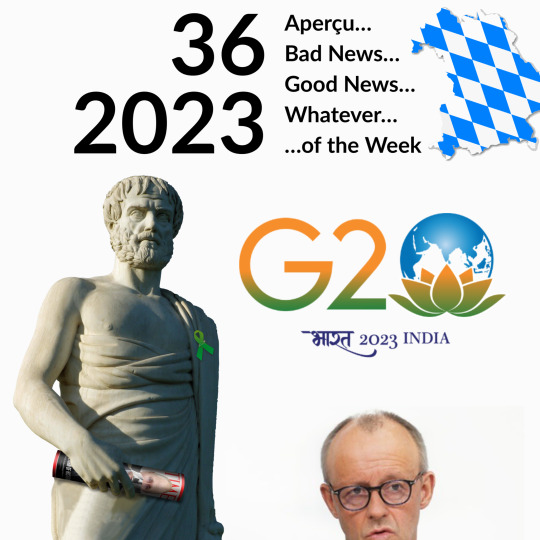
2023 / 36
Aperçu of the Week:
“Keep pushing!”
(Literally every Formula 1 team principal over radio)
Bad News of the Week:
"Opposition is crap" is what Franz Müntefering, the legendary party leader of the German Social Democrats, once said. He may be right. But that should in no way justify the fact that some opposition politicians limit their political positioning to just that: opposition. In other words, being against. Against everything the incumbent government does. Basically. But that is precisely what Friedrich Merz, head of the largest opposition party in the Bundestag, the conservative Christian Democratic Union (CDU), is doing.
As a reminder, Merz was fired by Angela Merkel at the time. He earned millions at Blackrock and thought he was in heaven - on his third attempt and after almost 20 years of political abstinence - when he finally became head of his oh-so-beloved party. But the 20 years have not been kind to him. Sometimes it seems as if he has been on another star. His catchphrase at beer tent speeches is "Kreuzberg is not Germany - you are Germany!" He is usually applauded for this.
You have to know that Kreuzberg is a district in Berlin that was very colorful for decades. Many peoples, many languages, many cultures, many religions. Beautiful, actually. But for Merz and people like him, the epitome of non-German. And then also woke - where you can order your cappuccino with almond milk, families can have two mothers or two fathers, and there's no one named Friedrich in kindergarten. So for a stick conservative, it's hell on earth. And for the political opponent (i.e. the Greens and everyone to the left of the CDU - in other words, everyone), the home of the ideologically lost.
Merz is wrong in two respects. For one thing, even Kreuzberg is gentrified these days. Investment bankers like him live in the barely affordable old buildings. And there are far more SUVs on the street than rickshaws. So the image of a parallel society outside the "usual norms" no longer holds water. On the other hand, we now live in the 21st century. In which "Who's afraid of the bogeyman?" is no longer played in the playgrounds and everyone knows that the vegetables at Tarek's or Giorgios' on the corner are better than those in the supermarket. So Merz has disqualified himself with his Kreuzberg bashing. Once again. My hope is that this will slowly get around to his clientele...
Good News of the Week:
At the latest when it became clear that China's head of state Xi Jinping would not be attending, the G20 summit in India looked like a flop. And then intermediate shades - such as whether the host would call itself Bharat instead of India - seemed to dominate. So a pure show event with pretty pictures for the evening news and political experts mainly analyzing what is not happening? No, far from it. India achieved many small breakthroughs and even three major ones that were not expected.
First, Prime Minister Narendra Modi and his Sherpas succeeded in issuing an official final declaration that was supported by all 20 states. Which seemed unlikely with Russia and the U.S. at one table. Even if the Russian war of aggression against Ukraine is not mentioned by name, the use of brutal force is condemned. An "impressive diplomatic achievement," as Die Tagesschau writes. "The host saved a presidency that was threatened with failure."
Then a gigantic infrastructure project was launched that clearly positions itself against China's "New Silk Road." At this point, at the latest, Jinping might have regretted not coming. India, the Middle East - including Israel! - and Europe are to be better connected with the help of the United States - with rail tracks, hydrogen pipelines and power lines for renewable energies. Apparently a plan to be taken seriously. Because Italy's Prime Minister Giorgia Meloni immediately took the opportunity to announce in New Delhi that her country (the only participant so far from the European Union) was withdrawing from the partnership program with China.
And finally, the G20 effectively became the G21. For the "African Union" was welcomed as a new member on the very first day. The maltreated continent is thus given a voice at the table where the fate of humanity is decided. The bottom line is that one thing is also clear after this summit: there are more and more significant players whose self-confidence is growing. The world is becoming more multipolar. And that is a good thing.
Personal happy moment of the week:
Last week I was having a lot of happy moments. Bavarian moments with a Canadian guest to be precise. It's always nice to be able to introduce someone to your region, culture, cuisine, language, country, city, etc. If this is well received and appreciated, you are happy that you are privileged to live here. And even things that are commonplace for you start to shine again. Bella Bavaria!
I couldn't care less...
...that the Kremlin's United Russia party was declared the winner in sham elections in the Russian-occupied territories of eastern Ukraine. Key word of this statement: sham elections.
As I write this...
...everything in Germany revolves around the ball. First, on Sunday, the German men's basketball team won the world championship in Manila in a complete surprise - yes, (also) against the USA. And my second home country Canada won the bronze medal - yes, against the USA. Then the German soccer federation fired national coach Hansi Flick for losing a test match against Japan on Saturday in a crash. After he got knocked out in the preliminary round against Japan at last year's World Cup and hadn't improved at all since. If Germany were not hosting the European Soccer Championship next year, they would even have to fear for qualification.
Post Scriptum
Germany's society is aging. That's why we need a good half million immigrants every year, even if some on the political right don't want to acknowledge that. However, we are facing international competition. In which we are doing anything but well. I just read a series of interviews in which expats tell why they gave Germany a chance (leading technology companies, public safety, moderate climate) but then left again (excessive bureaucracy, difficult language, lack of a welcoming culture). As long as no one at least speaks English at the foreigners' authorities, landlords bluntly prefer "Bio-Germans", foreign educational qualifications are not recognized and little Fatima is looked at askance in kindergarten, there will be no preservation of our prosperity.
#thoughts#aperçu#good news#bad news#news of the week#happy moments#politics#formula 1#opposition#cdu#friedrich merz#kreuzberg#g20#India#USA#bavaria#canada#ukraine#germany#basketball#soccer#migration#championship#silk road#elections#xi jinping#China#wokeness#pushing#kindergarten
2 notes
·
View notes
Text
youtube
I don't think I've ever felt so embarrassed to be an American, with the 2003 "Freedom Fries" fiasco perhaps taking a not-so-close 2nd to this (Yes, I'm that old. And how did that age, by the way? The whole, "Freedom Fries" thing?)
And just like the 2003 Republican Congress renaming French Fries to "Freedom Fries" in the US House of Representatives Cafeteria to "punish" France for not offering their support towards the Iraq War, I think this diplomatic fiasco will age more or less or much the same – that is, like a fine milk.
The banality of evil of course shows its ugly face once again: underlying those fried starchy sticks of "Freedom" are now anywhere between 400,000 to over 1,000,000 Iraqi deaths, just as underlying White House correspondent Brian Glenn's asinine question to Zelenskyy on when he is planning to "wear a suit" are roughly between 1,100,000 to 1,600,000 Ukrainian and Russian casualties so far total, both dead and wounded, military and civilian.
But here in Greece we are no strangers to such banality either, I'm afraid – that is, to the banality of obfuscating the truth with shallow and irrelevant aesthetic concerns.
We recently had a head-on train collision caused by gross governmental incompetence and negligence, and many pro-government supporters here have been criticizing the leader of the popular movement for justice and transparency, a mother who lost her only daughter in the accident, for "being too vocal" and "fixing her hair up too nicely" or "wearing red lipstick" and not "mourning properly." Because as we say here in Greece, "that's who they are."
These are the same people who once criticized our prime minister and finance minister for "not wearing a tie," instead of looking at their recommended policies and stopping to wonder why the European Central Bank, the European finance ministers, and the International Monetary Fund were opposed to a debt restructuring and to policies which would allow Greece to eventually repay its obligations to the Union, rather than sink further into an endless and unpayable deficit.
Stupidity has no flag I'm afraid, nor does superficiality for that matter. No country has a monopoly on idiocy.
And so, instead of a meeting of substance, here we have the fuhrer and his lackey boy Vance (who just couldn't wait to get a word in, and in doing so, derailed the entire proceedings), surrounded by sycophants (actual press outlets are increasingly no longer allowed in the White House, not to speak of real journalists), and of course, who could forget our very own homegrown imbecile Brian Glenn, asking the leader of a country at war why he isn't "wearing a suit," and making us oh so very proud, with his Fourth Reich girlfriend Marjorie Taylor Greene later calling President Zelenskyy's modest attire a "disrespect [to] America." *
* [And here I have to ask, J.D. and Marco, will you protect my freedom of speech now as an American living in Europe? Or do your protections only extend to racist hate speech and slurs against women? You might think I'm being far too harsh, or hyperbolic, or hysterical even, insulting all of you, but I'm honestly not; I am simply describing you. I'm describing what I'm seeing in your administration, whether it's the Aryan optics of Pete Hegseth and Karoline Leavitt as Secretary of Defense and White House Press Secretary respectively (optics which were only reinforced by the attempted removal of any reference *to the Tuskegee Airmen* in the Air Force's military training, among other such ridiculous and blatant historical revisions and erasures, as well as the reversal of any and all Diversity, Equity, and Inclusion initiatives for a more "meritocratic" society – a society which, to no one's surprise, seems to now favor predominantly the "merit" of White Christian Nationalists, just like in "the good ol' days" when America was "Great"), the apparent plans to displace millions of Palestinian people in order to create a "Trump Gaza" hotel resort, the threatening of a US House Representative with legal action and jail time for informing people of their civil rights, the detainment of US permanent residents with no just cause, the revoking of US student and work visas simply for the act of peaceful protest against a brutal and genocidal apartheid state, the deportation of asylum seekers to foreign labor and torture camps with no due process of law, the list goes on and on, and I'm sure you'll continue to find new ways to shock, dismay, and intimidate us (You're not going to intimidate *me*, because I have a *long* experience with people like you, and I know how short life is, but that's a different story). What would be a nice and unexpected surprise, however, is if you truly held to the "absolute" standard of free speech for which you have claimed to hold such a high respect. Even the Nazis after all seemed to believe implicitly in certain "gentlemans’ agreements”… Even the Nazis, in various telling moments throughout their wonderful tenure here on our European continent, whether it was Hitler’s conviction that the British would eventually come to the peace table out of some kind of mutual respect between western peoples, or Himmler’s estimation, even to the very bitter end, that the Americans would eventually engage in peace talks to allow the remnants of the Reich to persist as a stalwart against the “Communist hordes of the East” – even the Nazis, perhaps due to some vestigial remnants of their "refined Prussian-German sensibilities," still seemed to hold somewhere in their false and twisted hearts some kind of selectively bizarre, lofty ideal of "gentlemanly conduct." And even after slaughtering millions upon millions of soldiers and noncombatants, men, women, and children, they still held to this irrational belief in their “gentlemanly nature” so steadfastly, so unconsciously, that in one case, it didn’t even cross the minds of a particular few defeated Wehrmacht officers that the conversations they were having with one another in private, behind bars in an English prison at the end of the War, could possibly be being taped by British Intelligence! Well, now, because that just wouldn’t be gentlemanly, now would it? A perverse and absurd sort of "gentlemanly sportsmanship” can be found sometimes in the odd nooks and crannies of a barbaric people. I'm not holding my breath for any such "gentlemanly" conduct from you, of course, nor from any of those stalking my page, for that matter. However, if on the other hand, you are all genuine and sincere in your respect for total free speech, regardless of its source or political character, then all I can say is that we will find ourselves in an extremely awkward and very uncomfortable agreement indeed!]
Meanwhile you have Trump telling the democratically elected President of another nation, "don't argue with me," as if he's scolding a toddler, after Donald was gently corrected for repeating the lie that the US has given more aid to Ukraine than Europe.
And who could forget Vance's reprimands to Zelenskyy for "not saying thank you"? Or his regaling of his hands-on experience in Ukraine because he's "watched and seen the stories"?
Trump and Vance ganged up on Zelenskyy as if they were two older frat brothers initiating a pledge. And frankly, I wouldn't be surprised if that's where they learned these Machiavellian tactics: in their little secret orders: those right-wing college cults which serve as the perfect American training grounds for all sorts of young, soon-to-be fascists and knavish bootlickers. I speak from experience sadly; I've seen these tactics up close.
But again, in all this clownish nonsense, the substance is lost.
The questions on my mind are,
1) Why didn't Russia and the US come to an agreement for an independent Ukraine before the invasion, instead of the CIA and the FSB fighting for influence over twenty years, using the Ukrainian people as pawns in their imperialistic power games?
2) What's with these prominently displayed Ukrainian Neo-Nazi brigades, such as the Azov Brigade, and the long-standing support for far-right nationalism in western Ukraine? Why in Europe do we pretend as if this isn't the case? And why in Europe do we pretend like Ukraine is not one of the most corrupt countries on the continent? *
* [I ask this only because I just can't shake the feeling that something is "off" about Zelenskyy and his crew. They certainly don't strike me as the "angel saints of democracy" or that they would have any business spearheading "the new leaders of the free world" as has been suggested and even stated explicitly respectively. Such rhetoric doesn't increase public support for Ukraine long-term, but rather increases suspicion in the heart of any intuitive person, of any observant person who has followed the various coups and political movements unfolding in Ukraine over the past twenty odd years, and who can sense that something is awry. Now, here in Greece for example, if we were to be invaded by our neighboring country, Turkey, would there be far-right militias such as those of the Neo-Nazi group Golden Dawn participating in the resistance? Yes, that's very possible. And what do you do in that scenario, exactly? Try to disarm them? A desperate country in a desperate situation might need every single pocket of resistance it can muster. And so I can understand if Ukraine finds itself accepting for the time being some very unnerving and some very uncomfortable alliances for the sake of national unity and national preservation; they are facing a direct existential threat, after all. The difference is that here in Greece we don't have statues and monuments dedicated to known ultra-right nationalists complicit in the genocide of tens of thousands of Jews and Poles, such as Ukraine does in Stepan Bandera (We do know a thing or two about corruption, but that’s a different story…) As Americans and Europeans, we can choose to support Ukraine strategically without ignoring or pretending that the deeply concerning and problematic elements within both Ukraine's armed resistance and Ukraine's political culture don't exist. To do so will only erode public trust.]
And most pressingly,
3) How can you now let Russia keep the territories it has illegally occupied without completely destabilizing Europe and possibly other regions of the world as well, potentially bringing about an actual World War III?
It seems to me like the time for peace has long passed, and that ship has sailed. Terribly foolish mistakes were made by the previous administrations, but it's too late now to "make a deal." Any deal you make will result in a short-lived peace followed by an even greater conflict.
We're supposed to believe that Russia, having lost up to 234,000 men, is just going to take those few occupied territories, and that's going to be the end of it?
It's important to keep in mind that any future decision (or initiative!) made by Russian leadership will now be in the shadow of half a million casualties, both dead and wounded, and therefore, in the spirit of not allowing even so much the thought, let alone the prospect that so many Russian souls may have died in vain, or for such little territorial gain.
I don't see how you can make a peace deal now, pretending as if we are still in the same position we were in pre-invasion, and that assurances that Ukraine will never join NATO will be enough, when Russia has lost so many men.
I don't think Americans truly understand the numbers we're dealing with here, and I think Americans have a tendency to shrug at the losses of other countries, no matter how insane, as long as those losses are not their own.
Can you imagine between 165,000 and 234,000 American soldiers killed in action? Can you for a moment imagine the consequences of that, and what the US would do in response, or in the near future in order to somehow justify such losses to itself? What makes you think that Russia is any different? You think other countries just shrug off those kinds of losses, and then it's just business as usual, no harm, no foul?
To quote the Mexican cartel jefe in the 2013 film The Counselor, "Actions create consequences which produce new worlds... at some point, you have to acknowledge the reality of the world that you're in. I would urge you to see the truth of the situation you're in. The world in which you seek to undo the mistakes that you made, is different from the world where the mistakes were made. You are now at the crossing, and you want to choose, but, there is no choosing. There is only accepting. The choosing was done a long time ago."
At the beginning of the conflict, maybe a peace deal was possible. Now I just don't see how you can give Russia those territories on favorable terms without essentially predestining other nations to the same fate, whether it's dooming the Baltic states to another incursion by the Russian aggressor, or condemning some other small country to a future aggression by some other authoritarian state, for example.
Before the invasion of Ukraine the idea of Russia wanting to restore the glory of the former Soviet Union, or to take over the Baltic States, or to invade Poland, was absurd.
Now with the future of NATO appearing so uncertain, and with all these seemingly shifting geopolitical alliances, and with that absolute nut job holding the highest office in the United States of America, a wartime economy Russia gobbling up more and more territory to justify its previous human losses to itself doesn't seem so far-fetched.
And this is the issue I have with those on both the Left and the Right who claim that the idea of an expansionist Russia is absurd. Yes, it was absurd before the start of the Ukraine War.
But half a million casualties in, with that kind of sunken cost for Russia, and with the country seemingly now benefitting from its wartime economy, it doesn't seem so absurd anymore. Am I the only one who sees this?
It seems like on one side you have those who always thought that Russia was an imperialist power hyper intent on expanding, which it wasn't, and then on the other side, you have those who don't even seem to believe that Russia could ever become an expansionist power, not even now, not even with a major superpower like the US potentially facilitating and effectively legitimizing its land grabs with behind the door deals and underhanded backstabs we may never learn about and now have seen on TV and know all too well respectively (and as Trump said, it made for "great television"). Both on the Left and on the Right, both those who were always convinced that Russia always had aims to push westwards, and those who don't seem to think that Russia could ever push westwards, seem to be ignoring the simple fact that things change. What was laughably untrue yesterday could be true today; likewise what is patently false today could have been true in the past.
Before the Ukraine War, that expansionist Russia which both Democrats, Republicans, and EU foreign ministers spoke of didn't exist. Even if she secretly had such a desire, she didn't have the capability; she was a paper tiger. Well, not anymore. She's not a paper tiger anymore, and I'm afraid she might be gaining such a capability, with uncertain, shaky alliances in Europe and apparently a new friend in the United States (or at least, in MAGA; I refuse to equate the two). I'm afraid we created the monster we were afraid of – a monster which before our imperialistic hubris, arrogance, and provocations, didn't exist.
Unfortunately I don't know if there's any going back now.
But the jefe's advice in The Counselor that "The world in which you seek to undo the mistakes that you made, is different from the world where the mistakes were made," isn't so much an imperative for the peacemaking prospectors in the US licking their chops at Ukraine's mineral rights, as the greater effects of the Ukrainian conflict may not reach the US for many, many years. Rather, the jefe's advice is an imperative for Europe! We must understand the world we're now in, and that the world in which the mistakes were made no longer exists. We can't keep pretending as if we are still living in that previous world.
But the question, the dilemma predominately occupying my thoughts lately, is – even accepting that tremendous errors were committed over twenty-something odd years and then unfortunately committed to by both the US and Europe, and then even accepting that despite Trump and Vance's attempts to spin impressions towards American indifference to the war's outcome and project PR dominance in the diplomatic proceedings, these talks amount ultimately to a concession that the US and its vassals have lost – what does Europe do now? This is not a rhetorical question.
On both the Left and the Right here in Greece I hear talk of how "Europe is Over," but I wonder if those same people who appraise the situation thus, and perhaps correctly, but express such resignation so blithely and glibly truly understand what that means for those who live in Europe – and namely, for them!
The prospect of more and more European countries becoming caught in the middle of a devilish pact between a Russian aggressor in the East, and a peacemaking prospector in the West, should concern all Europeans.
I sense we are at a critical juncture. The only way I see forward is for Europe to unite – but not to unite on the terms of the creditors – we here in Greece have learned all too well the conditions of such a "unification." Many here warned just a decade ago about the divisive consequences of implementing such unsustainable austerity measures on the Southern countries. Now every European member state will be needed, and vital, but where will you find the unity?
In my other homeland, the USA, do you think the average Californian, or the average New Yorker, considers himself, or herself a citizen of a "creditor state," and feels resentment towards the citizens of the "debtor states" such as Mississippi and Alabama? Of course not. Because at the end of the day, they all consider themselves as Americans.
If Europe is to survive in this new world, we must also unify, as Europeans, and cease to uphold the distinctions between "the creditor nations" and "the debtor nations."
The only way I see forward is to federate under one flag, one president, one parliament, and one army, whilst also embracing the unique national identities of each member state. Without truly unifying, we are dooming ourselves to choosing between continuing to be the vassals of the US, or becoming the new vassals of China and Russia.
A kingdom divided cannot stand. But unified under one flag and one military, we can retain our values and our dignity whilst also maintaining more flexible economic relations with the other superpowers, instead of just being the pawns of one. And I do believe that a Europe truly united will be a superpower to be reckoned with. But we will have to stand alone – if not economically, then politically.
In an increasingly authoritarian world, if there is a place where democracy can survive, even if surrounded on all sides, then I do believe that place is Europe. But we will have to fulfill the promise of those same values which for so many years we have only paid lip service to. Likewise we will have to finally find some courage! Some courage, for Christ's sake! How many decades now have our leaders waited by the phone, waiting for their handlers to tell them what to do? We must forge our own path now. Enough with that nonsense already!
If unfavorable peace terms with Russia cannot be avoided, and they end up keeping the territories they've occupied so far, along with securing a guarantee of a neutral Ukraine, then so be it. But Europe must unite and bolster its defenses so that the Russians don't even think to make another incursion westwards. Meanwhile should relations normalize under this new understanding, maybe eventually sanctions could be lifted and trade could potentially resume. Who knows, maybe even the Nord Stream pipelines could be repaired, those pipelines the Americans blew up.
Europe should keep its options open and leverage its power as China's #1 trading partner, whilst also maintaining its character and political sovereignty. We also need to become more technologically independent and develop our own systems and infrastructure. Should former allies become enemies, it's not such a good idea to be so dependent on their operating systems. It's time to develop our own operational infrastructure, and "make the switch to Linux" in more ways than one, both literally and figuratively.
The future of the Ukraine War seems very uncertain right now, but Russia keeping those territories it has occupied seems like a foregone conclusion at this point. The question is whether Europe will step in to provide a security guarantee to the remaining western Ukrainian territories. Without that security guarantee, it sure does seem like Russia would just continue to encroach westwards – unless with good diplomacy Ukraine can effectively become a buffer state for both Europe and Russia.
But regardless, Europe must federate under one flag, one president, one military, one parliament, one treasury, one foreign policy – and become less dependent on the US yesterday. That's the only way I see forward without becoming vassals either to the Fourth Reich and its new Axis or to the Orwellian nightmare unfolding in China right now.
We can either submit to the banality of becoming yet another authoritarian state, or worse, some other authoritarian state's puppet government, or we can carve out a new path for ourselves and establish ourselves firmly as a free people for the first time.
The European leaders now are pushing for unity, but unity under that same old tired and failed paradigm we in the Southern countries have become all too familiar with. It won't work. Your policies may ultimately be remembered mostly for how they gave rise to neo-nazi scum and strengthened the far-right in so many member states.
You either change, or Europe is over.
But with a sincere effort, I do believe that Europe can survive, even surrounded on all sides.
For Europe to survive, we must unite, we must rapidly become technologically and militarily independent, we must bolster our defenses, but finally and perhaps most importantly: we must not fall victim to needless warmongering. We must tread very carefully, as a fox, or as a lynx, knowing that we are surrounded by potential enemies on all sides, but also knowing that we may gain new friends as well – or, at the very least, that we might establish mutually beneficial, albeit slightly uncomfortable relationships with those who do not share our values. These alliances might be precarious, but with robust trade and intelligent diplomacy they can hold. We can maintain good trade relations with countries which do not share our values, without necessarily compromising our values. But to do this, we must be in a stronger collective bargaining position; therefore we must unite. If we are divided, then each superpower can isolate us one-on-one, and in such strong-arm negotiations with tyrants, we won't "have any cards" as Trump likes to say.
Together, we have cards. Divided, we will have to compromise our values to appease some unscrupulous master, either on one side or the other, who will dictate to us who our friends can be and who our enemies are. And if we compromise our values, we will have fallen in the truest sense.
But who am I kidding? We have already fallen. Time to finally fulfill the promise of our shared human values for the first time. We can be that Shining City on the Hill if we are strong, smart, patient, and we move quickly.
The People of Europe must unite. We can no longer depend on our leaders. They got us into this mess in the first place. We must take the initiative as Free Peoples of Europe and unite. If this does not start from the bottom up, it will just be another exercise in warmongering and vassalage.
To the West you have the Fourth Reich rising. To the East you have its Axis power, a country run by mafiosos and oligarchs. To the Far East you have an Orwellian technocratic dystopia in the making (and in the West as well, actually, just with more polite pretentions towards "privacy").
If we do not unite, we will be at the total mercy of one or more of these powers. It's the only path I see forward. Together, each country within Europe can retain its national character. Divided, I don't even see how that's going to be possible... not the way I see the world headed. We will be subjugated one way or another if we do not unite.
You can either continue to be a vassal of the United States, who as you just saw with Ukraine, can toss you to the dogs at a moment's notice, or you can become a vassal of China.
But there is a third path. It seems to me like the third path I just described is the best way forward: to federate.
God help me but I just don't see another option for Europe realistically. If anyone has a better idea, then I'm all ears.
0 notes
Photo




‘The Crown’ Season 4 Review: It’s to Di For
Ann Donahue, IndieWire Nov 9, 2020
*Spoilers*
In a case of art imitating life, the addition of Princess Diana to the Netflix series revitalizes the Royal Family.
[Editor’s Note: The following review contains spoilers for Season 4 of “The Crown” and British history between 1979-1990.]
Like the good public school types that they are, the British Royal Family isn’t above a bit of hazing to those who seek to enter its inner circle.
It’s known as “The Balmoral Test” and involves diligent bouts of outdoorsy activity at the Queen’s castle in Scotland. (Traipsing over steep hills in the mud! Stalking stags to kill! Wearing tartans unironically!)
Season 4 of “The Crown” debuts November 15 on Netflix, and early on you learn Margaret Thatcher wore high heels, brought a briefcase and a sneer to Balmoral, and unequivocally, catastrophically failed the test. Diana Spencer wore boots, bangs, and a sweet smile, and passed with flying colors.
In the end, though, they both lose the bigger game of conquering The Firm.
After a subpar Season 3, it turns out that what this ongoing narrative of Queen Elizabeth really needed was an enemy — or two. In a season with the most pop culture audience pressure riding on it — because of the Princess Diana factor, there is no doubt that people who have never watched a single second of “The Crown” before now will tune in — Peter Morgan’s show delivers its best yet.
With the addition of Thatcher, played to gritty, galling Iron Lady perfection by Gillian Anderson, and Diana, a near-impossible role that Emma Corrin makes look effortless without descending into hagiography, “The Crown” gives a riveting look at a decade that codified callous excess in the characters’ public and private lives.
Instead of the world being seen through others’ eyes and leaving Olivia Colman on the margins to react — as she was left to do in Season 3 — Colman is now allowed to own the monarch’s authority in her performance. And with foils like Anderson and Corrin, all three turn in very brittle and beautiful performances.
The great fear was that the Prime Minister vs. Sovereign face-offs between Anderson and Colman could be reduced to tropes: either “It’s Girl Power time, Tory style!” or “Oooh catfight!” Thankfully, this is avoided entirely by letting both actors show their chops in the most understated and devastating ways at their command.
Morgan was the playwright for 2013’s “The Audience,” which envisioned the weekly meetings between the Queen and her long history of Prime Ministers, and it won Tonys for Helen Mirren (playing guess who) and Richard McCabe as Prime Minister Harold Wilson. Colman has extensive stage experience, most recently in “Mosquitoes” at the Royal National Theatre in London in 2017. Anderson has three Laurence Olivier Award nominations, including one for 2019’s production of “All About Eve.”
As a result, the scenes between these two are a study in the subtleties of power dynamics and differences in upbringing that are framed to read as beautifully on a TV screen as it would on the West End. What you see is Anderson as Thatcher curtsying particularly deeply at a certain moment, or Colman as the Queen making a calculated move to end the audience. What you understand is that Thatcher doesn’t get why someone with an inherited title should hold more power than her, and the Queen’s firm resolve to keep Thatcher in her place.
Yes, yes, yes, contemplating the wounds caused by the vicissitudes of the British class system is all well and good, let’s please get to the part about Prince Charles and Lady Di, rich people in doomed love. Or “Whatever love means?” as Charles agonizingly asked at his engagement press event as Diana wilted beside him. This famously public cringe-moment is recreated in “The Crown,” and it’s one of the reasons why this long has been the timeframe where the show stood the most risk of devolving into shadow puppetry.
The Charles and Di moments have been covered a million times in various news clips and documentaries; you can see the entirety of the terrible engagement interview at a moment’s notice via YouTube. Great credit is due to Josh O’Connor as Charles, Corrin as Diana, and Emerald Fennell as Camilla Parker Bowles, as they all find layered emotional textures to enrich the footage that’s been part of the pop culture vernacular for decades.
Corrin, in particular, does a hell of a job. This is not a Diana with a sad-princess-imprisoned-in-a-tower sheen — several episodes open with content warnings due to the graphic depiction of her disordered eating. The show doesn’t play coy: Diana was a particularly child-like very young woman who checked all the boxes for “virginal beautiful young princess” — and beyond that perfect-on-paper resume there wasn’t a second thought given to her mental health. She is shown without the emotional capacity or maturity to understand that this isn’t a love story; it’s a job to fill the global complexities of a role in a chilly, treacherous family.
Corrin pulls no punches; her Diana is winsome and frustrating, sweet and calculating. She is savvy and silly and petulant. She is world famous but starved for attention. Corrin spins around to the point of collapse as she dances, all desperate, keening, frenetic energy and no joy. It’s a complex portrayal of a complex person, one that is fully aware of the mythology that surrounds the character but isn’t weighed down by it.
Diana was an Instagram royal decades before there was such a thing, and it’s through gestures like famously hugging a child with HIV in the hospital that the princess tried to kill the Crown with her kindness. It’s something a perpetually battle-ready Thatcher would never conceive of doing — but it’s also something The Queen would never consider. But why shouldn’t they? What do we expect of our hallowed institutions, and why? If we can envision better, more humane treatment, why don’t we require it?
These are weighty questions, and they are asked in a show relentless in its ability to propagate its characters’ power through setting and spectacle. It goes without saying that the production design, hair and makeup, and costumes remain outstanding on “The Crown” — there is a reason the show is undefeated during its three-season run at the Emmys in the category of Outstanding Period Costumes.
The streak should continue this year if for nothing else than the combination of creating a wedding dress inspired by Princess Diana’s voluminous meringue and the true-to-life pink plaid ensemble the lonely princess wears to roller skate around Buckingham Palace. (Corrin also at one point wears a sweater with llamas embroidered on it — also based on an outfit Diana wore. The ‘80s were a lot.)
Beyond reveling in the tawdry candy-colored tale of Charles and Di, Morgan’s writing on the show routinely explores notions of classicism, privilege, sexism, and racism. But this time around, the undercurrents surface in a way that is timely, incisive, and, ultimately, more pointed and hopeful: If England can survive 11 years of Margaret Thatcher as Prime Minister, the United States will survive four of President Donald J. Trump and the craven GOP leadership.
This isn’t a particularly sunny take. The cruel deprivation, degradation, and devastation wrought by the Thatcher years is the basis of several episodes over the course of the season. A war was started out of preposterous personal motivation (Shout-out to former President George W. Bush! Some of us haven’t forgotten that you’re a war criminal!); institutional racism was bolstered and emboldened for oligarchical profit; public resources were diverted from the marginalized in the righteously cold-blooded notion that there is no implicit bias in society, it’s just that some are lazy and choose to suffer.
All of this is familiar. Very painfully, infuriatingly familiar. But as “The Crown” in this season shows, with a steel spine and ice in its veins, the Monarchy was built to withstand whatever onslaught comes its way.
So are we.
Grade: A
“The Crown” Season 4 will be available Friday, November 15 on Netflix.
#olivia colman#tobias menzies#gillian anderson#helena bonham carter#the crown#the crown spoilers#peter morgan#josh o’connor#emma corrin#emerald fennell#the crown netflix#The crown season 4
33 notes
·
View notes
Text
Hope is the Pioneer

Truly, I feel that I can’t say this enough but despite its flaws, StarPre has been such a wonderful season for me in so many ways.
And perhaps the most important one is what this final episode wanted to tell us.
Hope is what paves the way to the future.


Immediately starting with Yuni getting her planet and people back.
She’s been through so much to reclaim her home and her efforts are finally rewarded.
However, it is so important to remember that this miracle didn’t come about because she tricked the universe behind the mask of an idol or that she used her skills to steal from others whatever she needed to achieve her goal, without a care for who she harmed when she did.
The revival of the Planet Rainbow can’t be credited to the mysterious powers of “Twinkle Imagination” either, which Yuni willingly gave up in the end even though keeping it for herself would’ve fixed her planet in a blink.


Rather, the miracle was brought on by Yuni letting go of her prejudices and opening her heart to those who truly respect and accept her for who she is.
This led to Yuni finding the strength within her to be able to forgive Aiwarn, the person who caused her the most pain, which then helped Aiwarn realize the error of her own ways and show sincere remorse by aiding Yuni in finding a cure for the petrification of the Rainbownians.
Had Yuni continued only on the path of a phantom thief, distrusting everyone around her and only relying on herself, who knows how much longer it would’ve taken her to get here? Or if it would’ve been possible for her to reach it at all?
But the point is, Yuni outgrew what would’ve held her back. She threw away what limited her (resentment, suspicions, hostility) and instead chose to cooperate with others to save what was most important to her.
And she succeeded.


Then we have Lala, who’s gone back home after the battle.
No longer is she the neglected scorn of her community or the unfavorite within her household.
The fact that she wants to get back to work right away in order to help better Saaman, the reaction her parents give on not wanting her to leave so soon and that they were even making onigiri to eat together (!!) speak volumes of how gigantic a change her planet is undergoing.
An extremely good change, at that.


Saamanians are no longer overly relying on technology, even though it provided them with so much convenience before.
It’s not just about “Lala style” being the new trend.
Everybody wants to be able to walk on their own two feet now. Regardless of how harder it’ll be for them, at least they can live more freely this way.


They want to live freely like what Lala has learned to do, like what Lala is teaching them how to do.
People don’t have to be assigned and divided by aptitude evaluations anymore. They can chose what they want to do and what they want to be of their own will.
Had Lala not left Saaman in hopes of finding something better for herself, been influenced by her time on Earth and brought back that experience to share with her people, can we say Saaman could’ve removed their attachment to the system they made as the crux of their society?
I don’t think so.
Lala and Yuni’s world are changing, evolving, because they let themselves wish for something even better than what they could’ve imagine.
Yes, them. The girls whose imaginations were stated by the 12 Star Princesses to be even stronger than theirs, the creators of the universe itself!
And that’s just the beginning.


Fast forward several years later, MICHELLE OBAMA has become president of the USA!! HELL YEA, BABY!!! (๑˃̵ᴗ˂̵)و
Sorry, I just needed to say that, hee~ :D
Now back to the real important stuff...


The first girl we hear, not see, is post-timeskip is Elena.
And just by that, we already know she not only accomplished her dream of becoming a translator like her mom but she’s gone above and beyond by becoming the person tasked with the job of interpreting foreign news for the entire country of Japan!
What. An. Honor.
Seriously, an international broadcast of a monumental event happening for the nation and she’s at the forefront of that crew covering it. Such an incredibly happy and proud moment, one that other countries want to share their congratulations and well wishes for and Elena is the one chosen to help do just that.
Elena is helping bring smiles on so many fronts like the brilliant sun she is.
Her, a biracial woman of color.
Simply. Amazing. *claps* x3


Then of course, we have our beautiful moon.
Madoka, too, has reached taller heights.
Like her father, she’s become the leader of a very important force, fulfilling and continuing the esteemed Kaguya legacy as she’s always been expected to.
Unlike her father, however, whose (previous) job as a government official was to search for, expose and expel aliens, Madoka is now the head of a project that’s the first, but crucial, step to establishing connections with worlds beyond Earth.
In other words, proactively engaging and forming friendship with the aliens.

And in the face of her father, now Prime Minister, she is nothing but composed and confident.
In her team, in their efforts, in herself.
Again, so different from the Madoka at the beginning of the season who couldn’t even smile from the bottom of her heart until her friends taught her how.
Now she’s out there breaking down barriers in hopes that they can reach even further, to create more relationships like her own. Relationships that can bring so many benefits to Earth and still withstand even the distance of space.
Short-term goals, long-term goals. There’s still so much for Madoka to do.
But when you look at her expression, you can tell that she is nothing but sure in her ability to make them a reality.

That positive outlook not only shaped her but also, I believe, changed her father as well.
For once, it’s Madoka who’s teaching him instead of the other way around.
To not think so restrictedly and to let things come into their own potential rather than controlling them.
If it weren’t Madoka rebelling against him those years ago so that she could find her own way to become the person she is, I doubt things could’ve turned out as well as they did, including him becoming Prime Minister and smiling proudly at her, no less.
Madoka has achieved so many things and will go on to do even more and he’s incredibly proud of her.


Next, the star that never stopped shining, Hikaru.
Let me just say that becoming an astronaut at a major space program must not be an easy feat.
Getting selected to be part of the crew who gets to go space, even more so.
But if we know anyone who can do it, it’d be Hikaru.
Hikaru who’s so passionate about the things she loves, who fervently admires space more than anyone, who wants to know all about the unknown there is to discover out there.
Hikaru, who has a promise to keep with her best friend who’s waiting for her.

Did we expect any less of her?
Certainly not.
She’s made it and she’s coming back to space!

Light years away, said best friend is still waiting but also searching for ways to get back to Earth.
During that time, Lala also climbed ranks of her own, becoming an inspector-of-sorts for the Starscape Alliance and traveling among planets, checking their conditions and reporting them back to her superiors. Making sure the cosmos are in order and so on.
Fortunately, she is not alone as she has Yuni to share her feelings with since they fought alongside together before.
The two Cures from other worlds.
It’s nice to have someone who understands you in that way, which is why I have at least one reason to be glad that Yuni was integrated into the team as the mid-season Cure.

As for Yuni, I suspect she seldom leaves her planet and has her own busy schedule on trying to make it more habitable to live in.
Thanks to Aiwarn, who may or may not have taken up permanent residence there (and really rocking that haircut), it’s no longer just a possibility anymore and the prospects are growing day by day.
Although I still can’t say I care much for her, I think it’s super nice the Rainbownians have welcomed her among them as Aiwarn had always wandered as a lost child in need of a home and the lack of one is probably why she became so vile and unstable in the first place. With that no longer a concern, she can put her brains to better uses.
On another note, there is no indication whether or not Planet Rainbow has joined the Alliance themselves but I’m pretty certain Lala’s been specially assigned to communicating with them anyway (thanks to her friendship with Yuni) so at least the relation is much more amiable than it was before, even if Rainbow chose to remain independent.
In short, everything’s well on this side of the universe.


A fact further supported by the Notraiders having a planet of their own to call home.
And what a beautiful star it is.
Everything’s flourishing and in bloom. A far cry from their previous headquarters which was perpetually dark and barren.
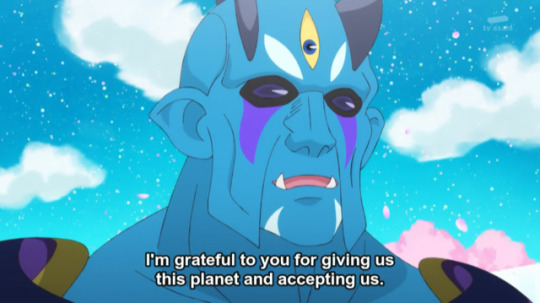

The facts that the Notraiders themselves made this planet beautiful through their own teamwork and that it was the Starscape Alliance who gave them this planet make it exceptionally more heartwarming in hindsight.
Because remember, these poor souls didn’t have a place to belong. Their previous homes either were destroyed or rejected them.
And then they had their sense of loss twisted and manipulated by Ophiuchus, resulting in them doing bad deeds.
For that, one would expect them to be thrown in jail, maybe even for life. But instead, they’re forgiven and sympathized with.
One would probably expect that they’d want revenge on Ophiuchus as well but instead of chasing after her, they focused all their energy and efforts into making a home for themselves.
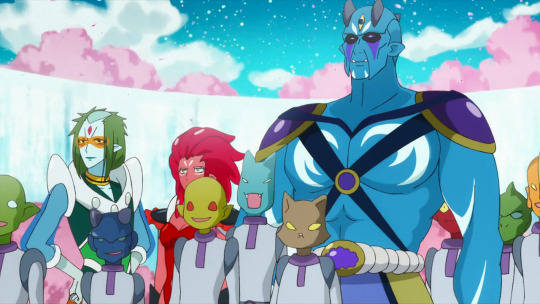
Rather than punishment, a second chance.
Rather than destruction, creation.

So exactly what point am I trying to make here?
Well, I believe that word “hope” means so much more than what we think it really is.
Hope is not just simply having aspirations and dreams. It’s not the good to counter the “evil” of despair.
Hope is something even broader, more difficult, more terrifying and of course, more magnificent than its basic definition.

It’s a sentiment we all share for wanting see a better tomorrow.
A tomorrow where we can have more than what we have today.
Like the world becoming more innovative, more progressive.


More peaceful and forgiving.
Supportive, understanding and accepting.


Kinder and closer together than we are now.

But tomorrow is also full of unknowns, doubts and questions.
What if it’s not worth it?
What if the world won’t let me be what I want to be?
What if I’m rejected or shunned? What if no one accepts me?
What if I get hurt?

That fear will always be there and it’s indisputable there’ll come a time when you will get hurt because no one lives without being hurt, after all.
From that, you’ll learn what anger, sadness and misery feels like. It’ll either make you want to hide or lash out to protect yourself. It’ll feel like everything’s stopped at that point and you’re stuck there, not knowing what to do next.
But still, there’s always a choice for you to make.
You can decide whether to stay as you are or try to move again.


That is not to say those feelings of helplessness will be invalidated if you choose the latter. Nor does it mean you shouldn’t have felt them in the first place or give up on your cautions entirely.
Rather, it’s because you have those feelings that you can move on from them. To shed them for something better and greater.
“I may be afraid but I don’t want to be afraid forever. I want to face the world with my head held up high.”
“I’ve been hurt and I don’t think I can forgive. But there is something that means even more to me than that.”
“If nobody wants me, if there’s no place for me, then I just have to make a place for myself to be who I am!”

Hope is not guaranteed success.
It won’t always give you the results you want, no matter how strongly you wish for it, and may even bring you down worse than you thought it would.
But without hope, without imagination, then there is no future or possibilities. There is only nothing.
It’s because there’s imagination that worlds and universes can exist. It’s because there is the unknown that we have the desire to know more and become more than what we are now. It’s because there’s hope for us to cling onto that we can always strive to move forward.

All it boils down to is whether or not you’ll let your hopes be hindered by whatever blocks your path.
Be it hesitations, criticism or negativity in any form.
But once you overcome that, the outcome may be even more kirayaba than you could’ve ever imagined.
That’s all, folks! Thanks for reading! :)
#didn't quite turn out how I wanted to say things but eh I gotta pack for trip then go to dinner#star twinkle precure#hoshina hikaru#hagoromo lala#amamiya elena#kaguya madoka#yuni (precure)
120 notes
·
View notes
Text
Pluralistic: 27 Mar 2020 (Mar-a-Lago Virus, plutes cash in on stimulus, postal voting vs USPS collapse, "civility" and the Confederate playbook, Bojo has covid, reasonable covid food-safety advice, SF cocktail delivery, flu pandemic photos, free hi-rez covid stock art, Warren campaign frees its software)

Today's links
The US is now the epicenter of the pandemic: Trump has murdered millions.
Plutes cash in on stimulus: $170B for real-estate tycoons.
States prep for postal voting: But the GOP has all but murdered the USPS.
"Civility" and the Confederate playbook: The right's call for "civility" has a long, dishonorable history.
Boris Johnson has coronavirus: He greenlit national pox-parties, now he has it.
Reasonable covid food-safety advice: Sanitize your hands and your cart, practice social distancing, and…you're done.
San Francisco cocktail delivery: Courtesy of the DNA Lounge.
Flu pandemic photos: Mask-slackers beware!
Free hi-rez covid stock art: Make your pandemic more visually varied.
Warren campaign frees its software: Free, open and universal campaigning tools.
This day in history: 2005, 2010, 2015, 2019
Colophon: Recent publications, upcoming appearances, current writing projects, current reading

The US is now the epicenter of the pandemic (permalink)
The US is now the epicenter of the global coronavirus pandemic, henceforth known as the Mar-a-Lago Virus. It has the highest number of infections of any country in the world.
https://coronavirus.jhu.edu/map.html
There have "only" been 1,000 US deaths so far. The "only" is there because there are so many more to come, when the vast number of incubating cases start manifesting symptoms and begin to die.
Trump wants the country to go back to work by Easter, because in his version of the Trolley Problem, the most important thing is saving the trolley.
https://www.theverge.com/2020/3/25/21193670/trump-easter-coronavirus-isolation-relax-rules-economy-social-distancing
We had so much warning. But the president said it wasn't anything to worry about.
Now, a lot of people are going to die.
Most of the dead will be old – from the demographic most likely to have voted for Trump (which isn't to imply that only Trump voters will die, or that they deserve to die – only that Trump chose to put his base at risk).
https://pluralistic.net/2020/03/24/grandparents-optional-party/#turkey-shoot
Many will have contracted their infections by deliberately seeking out crowded public places as the pandemic started spreading, because Fox News told them that doing so was a way to own the libs.
Fox News viewers – who skew elderly, even by the standards of TV watchers – are also disproportionately at risk from coronavirus. Fox News is now a suicide cult.
https://pluralistic.net/2020/03/19/gb-whatsapp/#fox-cult
But so many people will die because of this. Old people. Young people. People with disabilities. People who just had very bad luck. Kids.
And that's before you get to all the people who have car wrecks or heart attacks or slip-and-falls and can't get treatment in overloaded hospitals.
When Hoover fucked up by giving in to plutes and crashed the economy, he got tent cities, or "Hoovervilles."
Trump's fuckup will end with mass graves. Trump Mausoleums? Mar-a-Plague-Pits?
We will get through this. But Trump will have murdered so many of us before it's over.
https://www.theverge.com/2020/3/26/21196267/coronavirus-usa-cases-covid-19-pandemic-china-number-positive-trump

Plutes cash in on stimulus (permalink)
The stimulus package that the GOP Senate passed has the largest-ever giveaway for real-estate plutes in US tax history: $170 billion in tax-cuts over 10 years for couples with more than $500K in annual capital gains.
https://www.nytimes.com/2020/03/26/business/coronavirus-real-estate-investors-stimulus.html
The President who will sign the bill into law is a real-estate investor who stands to make a fortune from it. His inner circle is packed with similarly situated rentiers.
It's the second-biggest giveaway in the stimulus package, and it will also give windfalls to wealthy oil and gas investors.
The House is expected to vote on it today.
(Image: Rich Brooks, CC BY, modified)
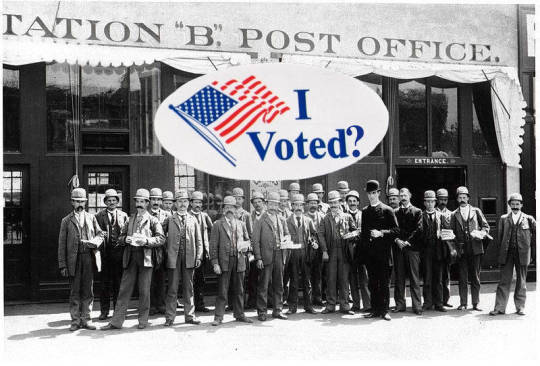
States prep for postal voting (permalink)
States are scrambling to prepare for a postal ballot-based election next November.
https://www.pewtrusts.org/en/research-and-analysis/blogs/stateline/2020/03/23/states-begin-prep-for-mail-in-voting-in-presidential-election
Postal ballots tend to benefit Democrats, whose voters are disproportionately unable to get off work to vote, and who are more likely to live in regions where GOP statehouses have closed polling places, adding long drives and long queues for in-person voting.
That's why Red States often have state laws that prohibit unrestricted postal voting, insisting that voters must provide a "good reason" for their desire to exercise their franchise to a bureaucrat who gets to decide whether or not they can participate in elections.
Of course, if Trump throws hundreds of thousands – or millions – of (disproportionately GOP-voting) seniors into the coronavirus volcano to appease the market-gods, the survivors may be gunshy about voting in person, even if they continue as fully paid-up Trump cultists.
There are serious challenges to reorienting towards a largely postal election, including mobilizing printing resources during a lockdown.
But even more challenging is the post office itself, which is on the verge of collapse.
https://www.politico.com/news/2020/03/23/coronavirus-postal-service-june-145683
The USPS is a miracle of self-funding resilience, a universal, small-d democratic institution that serves the whole nation. But its existence is a thorn in the side of shareholders UPS and Fedex, who donate lavishly to Congressjerks who fuck with the post office.
Requiring the post office to fund pension liabilities for workers who aren't born yet is transparent fuckery. Combine that with a sharp decline in mail usage during the lockdown and the service is now on the brink.
That would be bad news, and not just for elections. The USPS is key to America's emergency preparedness, and has been since the Cold War, when it was projected to serve as a survivor-counting/corpse-hauling service after nuclear armageddon.
It's the only institution that could deliver covid meds to every household in America in a single day.
https://pluralistic.net/2020/03/25/national-emergency-library/#going-postal

"Civility" and the Confederate playbook (permalink)
You may have heard conservatives insist that the reason they stick up for eugenicists and other cryptofascists is that they're standing up for "civility" against the "social justice mobs."
This rhetoric isn't new: it's literally the same thing that slavery apologists said in the runup to, and aftermath of, the Civil War: "we're not in favor of slavery, we're just opposed to the shaming and social exclusion of slavery advocates.
https://www.washingtonpost.com/outlook/2019/08/29/conservatives-say-weve-abandoned-reason-civility-old-south-said-that-too/
When we learn about the antebellum slavery debate, we hear about slavery's defenders – but the mainstream debate over slavery wasn't about its merits, it was about the incivility of abolitionists, and how that compromised the free speech of enslavers.
Slavery advocates were cast as a disfavored minority, shouted down by mobs who refused to hear them out. But discrimination against slavers was a funny kind of discrimination: half the millionaires in America were slavers in a single southern town.
Likewise, the right-wing figures who today claim that they are censored and cast out by the intolerant left are millionaires who fill arenas and appear regularly on Fox News, the most popular cable network in America.
They publish books with Big Five publishers and go on multicity tours. They're courted by "progressive" news outlets as paid on-air commentators to provide "balance." If that's discrimination, sign me up.
John Wilkes Booth, who assassinated Lincoln, professed love of Black people, and claimed he was animated by anger at the suppression of honest debate on racial politics, unable to share "my thoughts or sentiments" about slavery in polite society.
Slavers cast anti-slavery rhetoric as "orthodoxy" and cast themselves as realists who were willing to speak truth to power.
Does that sound familiar?
The abolition movement – including Lincoln – focused on these slavery apologists, understanding that they provided the cover for the continuation of slavery.
Lincoln insisted that Douglas go beyond lamenting the angry rhetoric of abolitionists and instead describe what he stood for – beyond his support of slavers' right to "choose how they wanted to live."
He demanded that Douglas go beyond his campaign speeches against "mob rule" and state plainly whether he wanted an America with or without slavery.
In her Washington Post op-ed, Eve Fairbanks suggests that we do the same for the "reasonable right" – pin them down. Sure, you don't like "cancel culture," but what do you stand for? What kind of world do you want?
(Image: Anthony Crider, CC BY)

Boris Johnson has coronavirus (permalink)
UK Prime Minister Boris Johnson has coronavirus.
https://twitter.com/borisjohnson/status/1243496858095411200
Under Johnson's leadership, the UK pursued a month-long plan to turn the nation into a giant pox-party, hoping to attain quick "herd immunity."
He was following a promising strategy devised for less-lethal, less-contagious flus, which was manifestly unsuited to coronavirus, as experts argued at the time. As a result, infections now rage out of control in the UK.
https://www.reddit.com/r/Coronavirus/comments/fnl0n6/im_a_critical_care_doctor_working_in_a_uk_high/#fla1iq6
During the planning of this "herd immunity" strategy, Johnson's chief advisor Dominic Cummings acknowledged that it would likely murder elderly people: "if that means some pensioners die, too bad."
https://pluralistic.net/2020/03/24/grandparents-optional-party/#death-panels
After Johnson tested positive for coronavirus, Cummings was seen fleeing Number 10 Downing Street at a dead run.
https://uk.news.yahoo.com/dominic-cummings-seen-running-no-114514496.html
(Image: Think London, CC-BY, modified)

Reasonable covid food-safety advice (permalink)
There's a viral (ugh) video going around in which an MD in scrubs (at home!) shows you what you should do when you come back from the grocery store. It's frankly terrifying. It's also wrong.
As Don Schaffner, a food microbiologist, notes in his thread, not only is this advice wrong, it could make you very sick — either because you ate the soap that you washed your food in, or because you left your groceries on your stoop for 3 days.
https://twitter.com/bugcounter/status/1243319180851580929
There's no evidence that washing your food with soap will kill coronavirus, and even less evidence that you can get the virus from eating. There is, however, millennias' worth of evidence that you can die from food poisoning.
Schaffner's advice for groceries boils down to: wash your hands before and after grocery shopping. Wipe down the cart handle. Shop efficiently. Keep your distance from other shoppers.
You know, common sense.
(Image: Lyza, CC BY-SA, modified)

San Francisco cocktail delivery (permalink)
Hey, San Francisco! Craving a cocktail? The DNA Lounge will deliver a mason jar's worth (~3 servings) of Black Manhattan (w/Slow and Low honey & orange infused rye), Sazerac, brown sugar margarita (w/a little orange) or lavender lemonade gin cooler.
https://www.dnalounge.com/backstage/log/2020/03/26.html
The DNA is a San Francisco institution, one that runs on a shoestring and is continuing to pay its employees, even as other SF venues (snapped up by predatory corporate behemoths) shut down.
https://pluralistic.net/2020/03/22/preppers-are-larpers/#help-dna
They've also got a bunch of livestream events coming up, including a benefit for the Gay Gaming Professionals, a Death Guild set, and Hubba Hubba Revue's Burlesquerpiece Theatre.
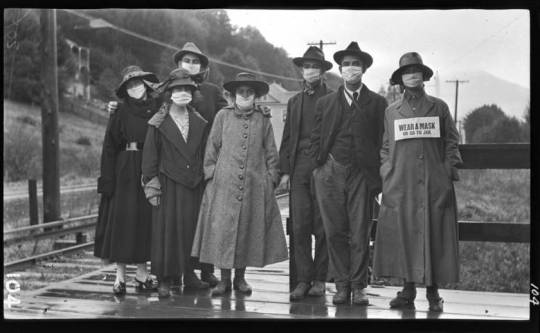
Flu pandemic photos (permalink)
During the 1918 flu pandemic, California went on lockdown. The governor ordered statewide shutdowns, and "mask slackers" who refused to wear masks faced arrest.
https://quod.lib.umich.edu/f/flu/0030flu.0009.300/1
The California Sun has rounded up an amazing set of images of California life during the 1918 flu from libraries, museums, and other sources," in gorgeous hi-rez.



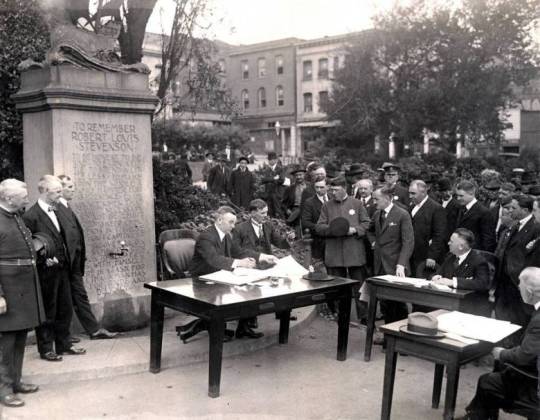



Free hi-rez covid stock art (permalink)
If this image seems familiar, that's because it's one of the only open-licensed images of the novel coronavirus, courtesy of the CDC. It's been used millions of times in just a few weeks.

https://tinyurl.com/u457y2d
An effects house called Covert has stepped in to fill the visual gap with a collection of gorgeous,crazy hi-rez covid renders: "No licensing, royalties or any credit is required for their use."
https://wearecovert.com/free-covid-19-animations-renders-images/




Warren campaign frees its software (permalink)
Elizabeth Warren's campaign has released seven of its sophisticated campaigning tools as free/open software.
https://medium.com/@teamwarren/open-source-tools-from-the-warren-for-president-tech-team-f1f27d2c7551
The Warren campaign had a large cohort of software developers and created a suite of outstanding tools, as well as making improvements to standard tools, including improvements to the texting tool Spoke that reduces the cost of using it by ~97%!
https://www.wired.com/story/elizabeth-warren-campaign-open-source-tech/
The projects are hosted on Github:
https://github.com/Elizabeth-Warren/
This isn't just an opportunity for campaigns, but also for small shops that provide integration and support to them. Obviously election campaigning is in a mess at the moment, but this is seismic.

This day in history (permalink)
#15yrsago Nepali media crackdown thwarted by bloggers https://web.archive.org/web/20050328204722/http://insn.org/
#10yrsago LibDem MPs won't fight for debate on Digital Economy Bill https://www.openrightsgroup.org/blog/2010/lib-dems-tories-and-labour-pledge-to-ram-disconnection-through
#5yrsago Top homeland security Congressjerk only just heard about crypto, and he doesn't like it https://www.techdirt.com/articles/20150327/07312030462/congressional-rep-john-carter-discovers-encryption-worries-it-may-one-day-be-used-computers-to-protect-your-data.shtml
#5yrsago NSA-proof passwords https://theintercept.com/2015/03/26/passphrases-can-memorize-attackers-cant-guess/
#5yrsago Welfare encourages entrepreneurship https://www.theatlantic.com/politics/archive/2015/03/welfare-makes-america-more-entrepreneurial/388598/
#5yrsago Here's the TSA's stupid, secret list of behavioral terrorism tells https://theintercept.com/2015/03/27/revealed-tsas-closely-held-behavior-checklist-spot-terrorists/
#5yrsago San Francisco Sheriff's Deputy ring accused of pit-fighting inmates https://www.sfgate.com/crime/article/S-F-jail-inmates-forced-to-fight-Adachi-says-6161221.php
#1yrago Elizabeth Warren's latest campaign plank is a national Right-to-Repair law for farm equipment https://medium.com/@teamwarren/leveling-the-playing-field-for-americas-family-farmers-823d1994f067
#1yrago Mystery solved: why has a beach in France been blighted by washed-up parts for toy Garfield phones for more than 30 years? https://www.lemonde.fr/big-browser/article/2019/03/27/l-affaire-des-echouages-de-telephones-garfield-en-bretagne-enfin-resolue_5442290_4832693.html
#1yrago McDonald's will drop opposition to increases in the federal minimum wage https://www.politico.com/story/2019/03/26/mcdonalds-lobbying-minimum-wage-1238284
#1yrago Front-line programmers default to insecure practices unless they are instructed to do otherwise https://net.cs.uni-bonn.de/fileadmin/user_upload/naiakshi/Naiakshina_Password_Study.pdf
#1yrago Alexandria Ocasio-Cortez schools Republicans on the true costs and beneficiaries of the Green New Deal https://twitter.com/briantylercohen/status/1110700996282343424?ref_src=twsrc%5Etfw

Colophon (permalink)
Today's top sources: Naked Capitalism (https://nakedcapitalism.com/), Slate Star Codex (https://slatestarcodex.com/), Kottke (https://kottke.org), Advertising Pics (https://advertisingpics.tumblr.com/), Fipi Lele.
Currently writing: I'm getting geared up to start work my next novel, "The Lost Cause," a post-GND novel about truth and reconciliation.
Currently reading: Just started Lauren Beukes's forthcoming Afterland: it's Y the Last Man plus plus, and two chapters in, it's amazeballs. Last month, I finished Andrea Bernstein's "American Oligarchs"; it's a magnificent history of the Kushner and Trump families, showing how they cheated, stole and lied their way into power. I'm getting really into Anna Weiner's memoir about tech, "Uncanny Valley." I just loaded Matt Stoller's "Goliath" onto my underwater MP3 player and I'm listening to it as I swim laps.
Latest podcast: Data – the new oil, or potential for a toxic oil spill? https://craphound.com/podcast/2020/03/23/data-the-new-oil-or-potential-for-a-toxic-oil-spill/
Upcoming appearances:
Quarantine Book Club, April 1, 3PM Pacific https://www.eventbrite.com/e/quarantine-book-club-cory-doctorow-tickets-100931360416
Museums and the Web, April 2, 12PM-3PM Pacific https://mw20.museweb.net/
Upcoming books: "Poesy the Monster Slayer" (Jul 2020), a picture book about monsters, bedtime, gender, and kicking ass. Pre-order here: https://us.macmillan.com/books/9781626723627?utm_source=socialmedia&utm_medium=socialpost&utm_term=na-poesycorypreorder&utm_content=na-preorder-buynow&utm_campaign=9781626723627
(we're having a launch for it in Burbank on July 11 at Dark Delicacies and you can get me AND Poesy to sign it and Dark Del will ship it to the monster kids in your life in time for the release date).
"Attack Surface": The third Little Brother book, Oct 20, 2020. https://us.macmillan.com/books/9781250757531
"Little Brother/Homeland": A reissue omnibus edition with a new introduction by Edward Snowden: https://us.macmillan.com/books/9781250774583

This work licensed under a Creative Commons Attribution 4.0 license. That means you can use it any way you like, including commerically, provided that you attribute it to me, Cory Doctorow, and include a link to pluralistic.net.
https://creativecommons.org/licenses/by/4.0/
Quotations and images are not included in this license; they are included either under a limitation or exception to copyright, or on the basis of a separate license. Please exercise caution.
How to get Pluralistic:
Blog (no ads, tracking, or data-collection):
Pluralistic.net
Newsletter (no ads, tracking, or data-collection):
https://pluralistic.net/plura-list
Mastadon (no ads, tracking, or data-collection):
https://mamot.fr/web/accounts/303320
RSS (no ads, tracking, or data-collection):
https://pluralistic.net/feed/
Twitter (mass-scale, unrestricted, third-party surveillance and advertising):
https://twitter.com/doctorow
Tumblr (mass-scale, unrestricted, third-party surveillance and advertising):
https://www.tumblr.com/tagged/pluralistic
When live gives you SARS, you make sarsaparilla -Joey "Accordion Guy" DeVilla
22 notes
·
View notes
Text
The problems that arise when politics is left to judges
An interesting and thoughtful polemic by an Australian Journalist, Waleed Aly, quoted from the Sydney Morning Herald. My highlighting.
“I suspect the death of Supreme Court Justice Ruth Bader Ginsburg means Donald Trump will win November's US election. You might think conversely that it favours Joe Biden, and you might even be right. What interests me is that everyone agrees her death is hugely significant.
We're looking at a political system where the death of a judge – or more precisely the vacancy it leaves on the Court – is of such grave political moment. It's worth pausing to think about that.
America, like Australia, professes a separation of powers between the legislature, the executive and the judiciary. It guarantees the independence of its judges, free to apply their jurisprudence free of partisan commitment and without fear of political retribution.
And yet the composition of our own High Court is never so party political as it is in America. This much you probably know. I raise it because I think it has lessons for us that go beyond matters of judicial appointment and into really broad questions of democratic culture. It has something to tell us about which ways of resolving political debates are wise and which aren't.
America is in this position because its Supreme Court has long assumed the role of resolving major political, social and even moral disagreements.
One reason for that is America's overwhelmingly rights-based political order, animated by its constitutional amendments so famed they are part of popular culture. Another is the deep political and cultural divisions that have characterised the country.
The result is a series of intractable controversies that, instead of becoming matters of democratic exchange, become reframed as questions of fundamental rights.
Rights are great. But when enshrined in a constitution, they can also be undemocratic. That's not a criticism; it's the whole point. Rights are things you don't get to vote out of existence. They exist to withstand majority assault.
Any vaguely liberal political system needs this for its own existence. But problems arise when rights become a primary means of making decisions, sidelining democratic processes that might otherwise have done the job.
That doesn't happen so much in Australia, but it happens in America all the time. If you want to understand why American politics is so reliably obsessed with guns and abortion, the starting point is to realise that the courts have extraordinary power over these issues.
So, for example, if you're a pro-life American, the real obstacle you have isn't the politicians writing laws, it's the Supreme Court decision of Roe v Wade which effectively made pro-life legislation illegal. A decision like that leaves pro-lifers with nowhere to go.
Politics has been rendered powerless on the issue, so there's only one way to fight back: install a Supreme Court that will overrule that decision. That's why even a character as unholy as Donald Trump can bank on evangelical Christian support. They can rely on him to appoint judges who are likely to flip the Supreme Court on the issue. And if they succeed in that, pro-choice Americans will be similarly stuck.
That's a process of profound exclusion for whoever loses. It's not so much defeat as disenfranchisement. When you resolve highly contentious issues in that way, you end up with a visceral, endless culture war, and your court ends up as the theatre for it. About the only hope for avoiding this is when the court's decision is unanimous.
Justice Ginsburg herself, while being pro-choice, criticised Roe v Wade on exactly these grounds (among others) in a famous lecture before she joined the Supreme Court. For her, the decision disrupted political processes that were already under way to liberalise abortion laws.
"Heavy-handed judicial intervention was difficult to justify and appears to have provoked, not resolved, conflict," she said.
Australia provides good evidence for that. Abortion never became an incendiary political issue here because it is resolved by the democratic process of state governments passing legislation.
And democratic change is often more stable and less combustible than judicial change because even if you oppose whatever legislation is in place, you can't claim your voice has been forcibly excluded from the issue in quite the same way.
Even something like native title, a genuine piece of legal creativity from the High Court in the Mabo case, doesn't suffer from American pitfalls.
That decision was quickly enshrined in government legislation, giving it democratic legitimacy. That probably makes it more like Brown v. Board of Education, which ruled against racial segregation in American schools, and eventually culminated in President Lyndon Johnson's Civil Rights Act.
The lesson here is that winning isn't everything: how you win matters, too. That's true even when the courts aren't involved. One of the reasons Australia is in such a hopeless position on climate change is that our big breakthrough – the carbon tax – became a symbol of illegitimacy because by Julia Gillard's own admission, it spectacularly violated an election promise.
I'm convinced the electorate's anger wasn't directed at the policy so much as the process that delivered it, which while technically democratic, was drowning in deal-making that seemed to have little to do with the will of the people. Climate policy has been poisoned ever since.
If I had to distil this into a principle, it would go something like this. If we want reforms in our politics to be durable, and we want our society to emerge from them intact, we must always consider how they look from the losing side. In political debate we should only use weapons we'd be happy to see used against us. Because one day, they will be.
You might be comfortable with your side of politics, say, using the school curriculum to impose a particular view of the world, or replacing independent public servants with partisan appointments. But when the other side does the same to you, whatever discomfort you feel will be the symptoms of a corrupted political culture.
That might seem abstract in a time of intense polarisation, when everything feels like a fight to the death, but the consequences are very concrete indeed. That's something Ruth Bader Ginsburg understood. She'd be appalled at the cynical politicking that has followed her death. She'd also know exactly why it's happening.”
Quoted from the Sydney Morning Herald.
Here in Britain, thanks to former Prime Minister Tony Blair (like his wife, Cherie, a lawyer) the Law Lords, who used to be an integral part of Parliament, are now established in a separate Supreme Court, and instead of the Rule of Law, we are rapidly becoming a country Ruled by Lawyers, who all too often seek to overturn the rule of a democratically elected Government.
1 note
·
View note
Link
George Soros, the billionaire investor and liberal donor, sat in his hotel suite by Lake Zurich last week, lamenting the turn much of the world has taken in recent years: "Everything that could go wrong has gone wrong."
His favored presidential candidate, Hillary Clinton, lost to President Donald Trump, whose "America First" platform runs counter to the globalism Soros embraces. Trump, he said, "is willing to destroy the world." The European Union, which Soros once hoped would be so successful that he could end his charitable work in the region, is contending with the impending loss of Britain and a rise of anti-immigrant sentiment. And Soros himself has emerged as a political target in elections from Hungary to California, where his donations have been used as a cudgel against the causes he supports.
The 87-year-old Holocaust survivor, who has poured much of his fortune into promoting liberal values around the globe, is now confronting a wave of nationalist sentiment washing against issues he has championed.
But rather than recede from public life in his twilight years, Soros has decided to push even harder for his agenda, he told The Washington Post in a rare interview
"The bigger the danger, the bigger the threat, the more I feel engaged to confront it," Soros said Thursday. Wearing an open-collar shirt, he spoke animatedly for an hour, sitting at a table in his suite after an appearance at a Human Rights Watch conference.
Confronting brick walls
Soros' willingness to remain in the fray comes as he faces renewed vilification from a wide-ranging group of opponents that includes actress Roseanne Barr and Russian President Vladimir Putin. He has been accused of being an all-powerful puppet master, a Nazi sympathizer and the person controlling the Democratic Party.
He acknowledges that the attacks can blunt his impact.
"It makes it very difficult for me to speak effectively because it can be taken out of context and used against me," Soros said.
For all the billions of dollars at his disposal, Soros is also being forced to reckon with limits on his political influence in the United States. He acknowledged that he did not see Trump's election coming. "Apparently, I was living in my own bubble," he said.
Soros, who plans to spend at least $15 million in 2018 races, has already faced some setbacks this cycle. His bid to replace several district attorneys in California with challengers seeking changes to the criminal justice system was largely unsuccessful in Tuesday's elections. "We ran into a brick wall in California," he said.
Soros said he is certain in his assessment of Trump, whom he describes as a "narcissist" who "considers himself all-powerful."
But he does not appear settled on the strategy to defeat him. Soros said he disapproves of a campaign by fellow liberal billionaire Tom Steyer to push to impeach the president, saying he would only support such an effort if Democrats retake Congress this year and gain Republican support.
Soros, who said he wants to avoid dividing the party, also refused to pick favorites among the emerging crop of 2020 Democratic presidential contenders. But there is one prospective candidate he said he hopes does not get the nod: Sen. Kirsten Gillibrand of New York.
He blames Gillibrand for pushing the resignation of former senator Al Franken "whom I admire," Soros said, "in order to improve her chances."
Franken resigned in January after a number of women alleged that he touched them inappropriately. Gillibrand was a leading voice urging her fellow Democrat to quit.
She declined to comment.
Earlier this year, Patrick Gaspard, the former Obama White House political director who now runs Soros' Open Society Foundations, said he asked the billionaire how he viewed the organization's role at a time when so much of Soros' work is under assault.
"This is the moment we were built for," Soros responded, according to Gaspard.
The Hungarian-born Soros, who became one of the world's wealthiest people by managing hedge funds and betting on currency changes, has given away billions of dollars to groups promoting human rights, democracy and liberal causes.
His New York-based Open Society Foundations now spends $940 million a year in 100 countries, promoting values such as free speech and free elections, according to the group. In the United States, the Open Society spends $150 million a year financing groups such as the American Civil Liberties Union and Planned Parenthood.
For a period of time, Soros was the largest private donor in Russia, funding initiatives such as an anti-torture program, according to the foundation. Two years ago, Putin's government effectively banned Soros' group from distributing funds in the country, calling it "undesirable" and "a threat to the fundamentals of the constitutional system."
Last week, Putin suggested that Soros's spending around the world resembles the kind of political interference that U.S. intelligence officials blame on Russia.
"He intervenes in things all over the world," Putin told Austrian television. "But the State Department will tell you that it has nothing to do with that, that this is the personal business of Mr. Soros."
Elsewhere in Europe, Soros has also come under attack. This year, Viktor Orban, the right-wing prime minister of Hungary, won reelection after charging that Soros wanted to flood Europe with Muslim immigrants. Orban said one of his first efforts would be to pass a "Stop Soros" bill, aimed at cracking down on organizations he views as countering his agenda.
"I'm painfully aware that they are against the ideas that I stand for," Soros said of his critics around the world.
2016 and Trump
In the United States, Soros was initially seen as an ally by Republicans who shared his opposition to communist dictators. He made modest donations to support the GOP in the 1980s and 1990s, according to campaign finance reports.
But he turned decisively against Republicans after President George W. Bush invaded Iraq in 2003 based on faulty intelligence about weapons of mass destruction.
Since then, his political spending - a fraction of the money he gives away every year - has made him one of the Democratic Party's most reliable and generous donors.
In 2016, he poured at least $25 million into mobilizing Democratic voters in an effort to bolster Clinton and other candidates on the left, a Soros spokesman said.
In the final days of the White House race, Trump spoke in his closing television ad about sending a tough message to "global special interests" who wanted to control Washington, as images of Soros and other financial leaders who are Jewish flashed on the screen amid footage of Clinton.
Soros, who describes himself as an agnostic Jew, said he considered the ad "a coded anti-Semitic message."
On Election Day, Soros gathered with friends to watch returns in his Fifth Avenue duplex, overlooking the reservoir of New York's Central Park.
As the returns came in, "the party turned into a wake," said Anthony Romero, executive director of the ACLU, who was one of the guests.
Soros said he spent months studying what went wrong in the election. He said he concluded that while Clinton would have made a "very good president," she was not a good campaigner. "She was too much like a schoolmarm," Soros said. "Talking down to people . . . instead of listening to them."
But he said he also diagnosed a larger problem: the increasing ease with which people's opinions can be manipulated. "It is so much easier to destroy trust than to build it up," Soros said.
Soros has known Trump for years. Decades ago, the two men dined together several times at the Berkshire estate of a mutual friend, Soros said.
"I had no idea he had political ambitions, but I didn't like his behavior as a businessman," he said.
At one point, he said, Trump asked him to be the lead tenant in a new office building he was developing in New York City.
"Name your price," Trump said, according to Soros. Soros said he declined because he was concerned that being so closely associated with the developer, whose Atlantic City casinos were financially troubled at the time, would hurt "my reputation."
The White House and the Trump Organization did not respond to requests for comment.
Soros said that if Democrats win in a "landslide" and forge a bipartisan relationship with moderate Republicans, as he expects, then he would favor impeaching Trump "because he is endangering the United States and the world."
But even then, there would be a cost, he said: "This would make [Vice President] Mike Pence the president, who is much more competent in representing the far right, whose views with which I disagree, than Trump himself."
Races, donations, defiance
This cycle, Soros has focused his political investments on congressional races and mobilizing voters on the left. His largest donation this year has been $5 million to Win Justice, a voter-mobilization group focused on minorities, women and young voters in Florida, Michigan and Nevada.
He has also continued to invest in district attorney races, saying prosecutors are "the linchpin of the judicial system" and key to his effort to reduce prison sentences. He sent $1.45 million to a group that supported civil rights attorney Larry Krasner in his successful race for Philadelphia district attorney last year. A spokesman said Krasner had never met Soros or anyone in his organization.
Soros' recent efforts in California were not so successful. Three of his candidates for district attorney in California lost their primaries, and a fourth faces a runoff.
His financial support became a political issue in some of the campaigns. Sacramento County District Attorney Anne Marie Schubert, who defeated her challenger Tuesday, claimed that the city was "under attack" from the billionaire, "who has brought his war against law enforcement" to Sacramento.
The breadth of Soros' spending has made him a frequent target of critics on the right, who suggest he is secretly backing movements that appear to be driven by the grass roots.
Former congressman Jack Kingston, a Georgia Republican who is a CNN commentator, suggested on Twitter in February that Soros and other activists, rather than students, were behind a protest in the wake of a Florida high school shooting in which a gunman killed 17 people.
A spokesman said Soros had no involvement with the protest.
Kingston said in an interview that he was merely raising the question of whether Soros was involved.
"Some names invoke an emotional outcry from the red-meat crowds, and certainly he is one of them on the right," Kingston said. "The left has theirs. He does get that sort of sinister, that is, that kind of myth about him, that he plays in the shadows. Maybe that's wrong."
Last month, Soros' name went viral again when Barr tweeted that he is "a nazi who turned in his fellow Jews to be murdered in German concentration camps & stole their wealth."
Among those who retweeted her was the president's eldest son, Donald Trump Jr.
Soros, who said he used false papers at age 13 to survive the Nazi occupation of Hungary, calls such claims "a total fabrication," adding that they "annoy me greatly."
But he is not fazed, he said.
"I'm proud of my enemies," Soros said. "When I look at the enemies I have all over the world, I must be doing something right."
The Washington Post's Alice Crites and David Weigel contributed to this report.
Europe
George Soros
Russia
Elections
Donald Trump
Republican Party
5 notes
·
View notes
Photo




❝ “Prophet!” said I, “thing of evil!—prophet still, if bird or devil!—Whether Tempter sent, or whether tempest tossed thee here ashore. ❞
KANISHK WELLESLEY-MITTAL is a TWENTY-ONE year old MATERIALS SCIENCE student at TRINITY COLLEGE in the University of Oxford. HE is in his FOURTH YEAR of studies.
DESCRIPTION
You were born into gold. Your cot was lined with gold, and it is with gold that the shroud that will one day deliver you back to the Earth has already been woven. It is not gold that impresses you, but human hands, complex minds that shape senseless metallic lumps into intricate art. Gold is earthly and temporary, and you are carelessly derelict to the duties that by birth are assigned to you. Instead you gaze upon the sun, you gaze upon the stars, and behind all that exists is a question, a history, a mystery—and it is your destiny to deliver answers. Yet you only answer questions that others do not ask, and you perceive signs where others see nothing. This commitment to destiny has made you eccentric, myopic and superstitious in the eyes of others.
Two paths had lain in front of you: one carved for you by privilege, the other by merit. If there are those who strive to merge these two paths into one, but you are of the belief that they are innately irreconcilable. The other path innately requires agreement that bloodline and dynasty are the highest qualities one can hold, and the quest of knowledge has long been burdened by those who seek only connections and titles. Those who, in their entitlement, deprive others more deserving of opportunities, who contribute minimally in the effort they extend into the philosophy. You think yourself the greatest prosecutor of this rhetoric of reunification and you do not hesitate to make your disagreements known; it is poison and you will burn it at its roots.
CONNECTIONS
You, CAESAR, and JUSTINIAN were given the same choice between the two paths. CAESAR chose wealth and power over knowledge, and you did not fault him for it, but it didn’t mean you had to tolerate him either. His rhetorics of reunification disgusted you, and JUSTINIAN’s agreement provoked you to disgust someone who was once a peer. To your chagrin, the death of CAESAR has not killed his ideas. It is up to you, then, to commit this final murder of CAESAR.
The members of Sodalitas are little more than decorated shells, glimmering façades with little substance. MESSALINA seems to you the worst offender of them all. You have crossed numerous paths with them, your family inhabits the same social circles, and yet you do not know them well and you have no desire to know them further. They seem shallow to you, insubstantial. Maybe if you got to know them, you would change your mind, but for now they are the prime example to you as to why the two societies ought never to reunite.
There is no one who embodies all that Pandidakterion stands for as much as IRENE. Except sometimes you wonder if they do not take the ideology a little too radically. They purport that all of humanity has equal right to knowledge—that it must not be kept to a chosen few, whether these few are qualified by merit or bloodline. In truth, the world is unprepared for this knowledge, would not know what to do with it, would view those who partake in it with nothing but disgust. You keep a close eye on her, just in case.
FACECLAIM: Avan Jogia
This character’s tag can be found here.
BIOGRAPHY
One shoulder bore the weight of his mother’s legacy—the illustrious Lady Elizabeth Wellesley, a daughter of the notable Duke of Wellington and a Princess of Prussia, descended from Kaiser Wilhelm II, and, in turn, Queen Victoria. The other shoulder bore the weight of his father’s—not any more lacking in grandeur, Ashok Mittal, the heir of one of the wealthiest families in the United Kingdom, the son of the King of Steel, now a magnate in his own right, driving the chariot in his hands, president of the world’s largest steel manufacturing company. The weight pinned him down to the Earth and duty drew lashes on his skin as he fell to his knees. The paths that lay in front of him have always been illusions of freedom; interweaving paths that crawled to the same destination, and really, what use was resistance? What use was struggle?
And so he followed this path passively: he allowed his mother to shape him, to enter him into Eton and mold him as young men of his birth ought to be molded. She had no titles and neither would he inherit any, and so he would never stand among the House of Lords, but he could stand still with the House of Commons, could rise even to Prime Minister, she posited day through to night. His father, meanwhile, cajoled him towards a different direction. He honed and sharpened what he deemed to be acumen for business, a ruthlessness, an instinct for blood and power, the necessary skills to one day succeed him.
Kanishk took to business as he did politics—that is, he performed pallidly, limply, and disappointed his parents in every turn. He barely bothered to mingle with his peers in Eton, instead burying his nose in books of history and myth, fascinated by the rituals of old, twisted his tongue in Latin and Greek in order to invoke a muse before a daunting task, in order to submerge himself in Homer’s wine dark sea and kiln-fired earth. He cared little for spending time with the social circles of his mother, caring more for the time of the night when the Bengali woman tasked to care for him would recount him the epics of the old, the tales of the avatars as they appeared on Earth, and with her he contemplated the boundless universe as it existed all at once. In his trips with his father, he cared little for the sleek skyscrapers and the men in lush suits, instead begging for more time at the steel mills, to gaze upon the glowing orange of the forge, his shy exterior exploding into wondrous enthusiasm when it came time to ask the scientists questions.
Even as a worthier contender arose—his darling sister, Visakha, who untrained and unshaped had desired so deeply that which he cared so little for, displaying with great potency a proficiency and an affinity for the skills required to navigate both business and politics, the very same skills that Kanishk so weakly attempted to emulate out of obligation—it was he who they hailed their prince, he who they still expect to one day take the reins. It strains on their relations, but there is no other who understands Kanishk as well as Visakha, no other who he trusts or admires as ardently, and if there comes to be power in his hands, then the only good use for it would be to pave the path to allow Visakha to claim the empire that she deserves. What was once disinterest curled sourly into disdain. He grew to despise this same system which privileged him but denied his sister. Shyness and deference blossomed into anger, into passion in every pursuit.
Oxford was an easy choice for him. His study of Materials Science was acceptable to his parents, still under the spell that it might be to understand their industry better, still priming to take the position from his father one day—and they could believe what they wished to believe, but Kanishk studied materials science because the scientists at the mills had filled him with an insatiable curiosity, and together with his interest in an ancient world long gone he had found his niche in Trinity College, where there were tutors present who expressly dealt in this intersection of ancient materials. To the world outside it still seemed as though he was traveling these paths that led to one destination, but Kanishk knew now that he wanted nothing more than a life in pursuit of answers, of knowledge, a life submerged in the academic where since childhood he had exceeded, even stood out—affirmed when, one day, he was approached with an offer. His mother had told him of Sodalitas, even if in vague whispers. She was a member herself. He had received an offer, and this he met with disinterest. It was the invitation from Pandidakterion that filled him with glee, and with Pandidakterion he discovered a home unlike any other. Others to share this passion with, a society so deeply embedded into history itself.
2 notes
·
View notes
Text
BITTER NOSTALGIA: Modernism in the Now, the evils of Social Media, And how to recapture the modes of Mental and Physical Production
Note: this essay was included in a little book I made by hand for a class I took a few years ago.
What does it mean to be modernist within the modern context? Like those who have called themselves (or have been called) Modernist, one must, to label oneself as such, engage with the convention of “the now” (or what has become the convention of “the now”), within the ticking-clock – second to second – context of one’s own lived life.
This is an interesting pursuit – to know what is “the now”, to engage with it, to kill it, and reincarnate it as “the new” – because it seems like movements of thought, of art, of politics (etc) in the modern context come and go quicker than the tides. To know what is “the now” and what is “the new” seems like an impossible task with how quickly ideas spew forth via digital means. Movements (and the thoughts that inspired them – political, artistic, or other) that once took years to coalesce and take root before being considered convention, now go through an unnatural life cycle and become convention within months of being planted (their life spans, in extreme cases, sometimes limited to weeks or even days due to the speed of our Internet connections and the other tools that service our naturally flighty attention spans). The coming and going of exciting thoughts (and movements) is “the now”, it has become the conventional norm.
To make something “the new” until it becomes old, until either you kill it or some other idea comes along to smother it in its sleep (i.e. death by becoming convention), is the paradoxical goal of the Modernist. In other words, to be a Modernist is to always be in a state of de-stabilization, in a state of active “Boredom Murder” (because what is more boring than the rotting remains of some old idea). The modern context has provided us with the weapons (of mass destruction) we need to kill boredom, but, I fear, that some of us aren’t discerning in how we use these (potentially) destructive tools. Instead, we find ourselves being used by the weapons we think we wield (to maintain and nourish their development and existence instead of our own). The big question I want to explore is how do we recapture the modes of production. The simple answer: do what Virginia Woolf would do.
The Digital Revolution as the Epitome of Modernist Thought
Something that was “the new” in recent memory and had a huge, destabilizing impact was the digital revolution. Technology is the rocket fuel to a (potentially nihilistic) fiery human instinct that was embodied and popularized by the likes of Pound and Woolf and their fellow travelers – “to make it new”. This, inherently, is a destructive force. It is a mode of thought that advocates the deconstruction of tradition and convention, but not necessarily in favor of a new structure or mode of thought (the deconstruction is its purpose). As Mimi Parent writes in her essay “The Poetics of the Manifesto”: “The spirit of modernism is characterized… by its refusal of description, for what it conceives of as its own form of reality; art, representing often simply itself.” (Caws xxviii). Modernist thought exists only for itself, but cannot exist without a tradition or convention that precedes it (it cannot exist without something to tear down and rebel against).
John Lehmann’s attempt at a late Modernist movement (via his New Writing) was a reaction to the destabilization Pound and Woolf et al. advocated and practiced. He wanted art to be a stabilizing force and, in someway, he saw the –isms that emerged in the early years of Modernism as destabilizing and destructive forces. Lehmann wanted New Writingto be “…a more coordinated interpretation of the world “ (Bort 670), and saw the artist as social agent (someone who might effect change not just in the world of his or her own art, but in the world at large – i.e. he wanted artists and their art to be a stabilizing force within broader society).
Even though I agree in general with Lehmann’s premise (that –isms are by nature a destabilizing force), I disagree with him that art and artists should be a stabilizing force. This was also my issue with Lehmann’s oft-published contemporary Louis MacNeice’s writing during World War II. MacNeice serviced the structure of society over the expression of his own art and his own mind (or as Woolf so brilliantly puts it, “If we use art to propagate political opinions, we must force the artist to clip and cabin his gift to do us a cheap and passing service.” [as cited in Mc 72]). MacNeice clipped and “cabin-ed” his own gift to be a stabilizing force within a mass of people and for a government body. This is an absurd and narcissistic pursuit – one, I fear, we’ve all embraced too heartily in the modern, digital context. We no longer look to destabilize convention, instead we look to bolster political discourse and ideology with our own 2 cents (yelling at Presidents and Prime Ministers and other elected officials online, repeating slogans and systemic thinking from other eras, and all the while doing this on publishing platforms we do not own or control with thoughts and content recycled by our interactions in the digital sphere).
The problem with Lehmann’s concept (that to make something “new” is to shake the foundation of existence as it is currently known – even if it is a minor, subjective crisis), is that his movement strives for stabilization and therefore is striving for convention ad infinitum (no revolution, only boredom). There is an intriguing thread that emerges when you look back at this particular intersection of public people known for the exploration of their private selves and how, strangely, this once revolutionary act has become the norm. The digital revolution has allowed us to gut our private lives for the consumption of others. We have clipped and cabin-ed our own gifts and do our thoughts and ourselves a cheap and passing service indeed.
Our thoughts now, in the digital age, once spewed into the ever-expanding digital sea evaporate like rubbing alcohol on skin. Even though there’s more thoughts and places to put them, spewed by infinite anonymous hordes (of all classes, creeds, racial and gender categories – a good thing, in concept, to be sure), these so-called democratic tools that have seemingly given the horde’s voice has simultaneously erased those voices by hiding them amongst the infinite others (amongst themselves). What at first shook the foundations of what was conventional (music, book publishing, newspapers, etc), now functions to stabilize itself – it has become the convention. But the barriers we now face have been made invisible (or, if not invisible, seemingly insurmountable). The revolution of digital publishing gives us a delusion of free speech, of control, and blinds us to the fact that we are throwing our thoughts, precious pebbles, into a vast sea. The advent of the internet and publishing platforms like Twitter or Wordpress or Tumblr or Facebook (etc) has at once democratized access (provided the ability) for anyone (despite their class, creed, racial, or gender categories) to build “intellectual capital” without, seemingly, the praise or approval or allowance of a Gatekeeper or a “Beadle” (ala Woolf’s “Beadle” from A Room of One’s Own). Yet what has really happened is that the Beadle has become the platform and our thoughts are its food (they exist for its sustenance and not our own).
One might argue that modern digital revolution has done for everyone exactly what Woolf advised other women writers to seek out: provided “money and a room of one’s own” (2) without acknowledging that the room and the money are made of 1s and Os (or, in other words, they’re made out of nothing or, perhaps, made out of a lie agreed upon). When we publish into the digital sphere via these platforms, we are not in control anymore – despite appearances.
But it is not all bad. Sometimes miracles do happen – pebbles do float! People find each other. Communities are made. Revolutions are turned. And awareness that the digital realm is a sledgehammer and not the one that wields it, can lead to new ways of destabilizing what has become convention (of thinking and being and interacting with the world that, ultimately, in even microscopic ways, shift the ground beneath our feet).
But the question becomes, if this is “the now” what is “the new”? My answer: the new is the old. It is to treat our thoughts as precious and to give them a fighting chance to be seen in a light that transcends convention, to access or create an audience looking for a way out of “the now” and to move all of us toward “the new”. My answer is to follow in the steps of Virginia Woolf and make my own little book.
This is not necessarily a profound idea – to make a book. But it does do something interesting – it reclaims the means of artistic production. Not only the physical, but also the mental. It treats the thought as precious and as a commodity that the individual (not the platform) gets to exploit as they so choose.
Virginia Woolf
In A Room of One’s Own, Woolf advocates a private reckoning with the self as “writer” and she advocates this for women in particular but also, by inference, all classes of people who identify themselves as human beings. Her self-printing methods, adopted and adapted into the Hogarth Press and its methodology, created a system that promoted content and conversation over aesthetic concerns of physical production (i.e. content and thought over pretty books). Her “cheap” publishing methods (meant to eradicate barriers) anticipate, a century later, a mode of publishing — the Internet — that, virtually, has no barriers (“virtually” being the operative word – because digital publishing, again, is still the domain of the privileged… those with a minimum of an internet connection and a device to connect to it, but also those who control platforms and social networking hubs).
The fact that we have the ability to self-publish hardcover books using almost identical methods to Virginia Woolf and her contemporaries (that all of us so privileged with an internet connection and a printer and access to paper and video tutorials can do this) is a tiny miracle. Virginia Woolf’s ability to exploit one aspect of her privilege (money and a room of one’s own – or, at least, a table in the stockroom of the Hogarth Press) and then use that to disrupt the convention of her Gatekeepers (in this instance: the male dominated publishing industry) by cutting them out of the publishing process was a revolutionary act. By doing this, she burst through the barriers of the context in which she lived (her “now”), but also added value to her own output (she created her own market without asking for permission to do so). Another way of thinking about it, Woolf’s decision to self-publish and then create her own publishing house, turned her (and Hogarth) into a Lighthouse on a craggy coastline, a beacon in the dark, where other like-minded ships would be drawn to and a community (and market) formed around this simple, revolutionary act (of seizing the means of production – figuratively and literally).
This, I think, is something we have forgotten (or, at least, neglected) in our modern context. We’ve moved on from Woolf’s revolution, perhaps in a way Virginia Woolf, at least at first, would support. We live on digital platforms and publish directly to our peers. The trade off, invisible to be sure, is that the platform is not “ours”, it is an illusion controlled by folks with their own interests and goals, with their own terms of service (that might not have anything to do with our thought or expression of it, who have agendas that do not align with our message, but who exploit our participation for their own profit motives). In their modes of commoditization – these Pavlovian algorithms that trigger dopamine responses i.e. the pleasure we get from getting “likes” and “favourites” etc. – they, at once, attract a mass of humans (creating a market to exploit) and, at the individual level, intentional or not, alter the individual’s thoughts and language to comply with its meager rewards (with their system). These social media platforms have become our modern day Beadles telling us where on the grass we can sit. But the magic trick that these modern platforms have pulled off, the sleight of hand, is that they do this without confrontation. They use positive reinforcement to alter human behavior and make themselves masters (or, at least, profiteers).
Woolf, of course, had some thoughts on how to break these invisible chains. She said, “I’m the only woman in England free to write what I like. The others must be thinking of series’ [sic] & editors.” (as cited in Mc 64). What gave Woolf this freedom, of course, was her taking control of the modes of production of her own thought (mental and physical). In ’Opening the Door’: The Hogarth Press as Virginia Woolf’s Outsiders’ Society”, McTaggart articulates Woolf’s epiphany, “[as] she sewed bindings and set type, she saw that literary communications were not ethereal, free-flowing conversations, but material interactions between physical and mental labor” (66). Like behind the scene documentaries of films, Woolf deconstructed and stripped the “magic” and “power” out of the book making process, making it accessible to all sorts of folks from all backgrounds and, in her way, diminished the power of any gatekeeper (or “Beadle”) who would stand in her way. By making her own little book, Woolf recognized the inherent absurdity of the concept of the “Gatekeeper”. Why should we ask permission to have private thoughts or to share those thoughts with whom we like? Even though women and people of certain backgrounds and classes had to face real world Beadles, where real doors were locked and controlled, I think Woolf acknowledges that these Beadles (and the one’s that reside in our minds) embody the mass’s demand for the individual to comply in some way with broader convention (even though the mass doesn’t really demand it, it is not a thinking creature, civilization does not have a brain). Instead, these demands come from a small minority of people (white men with a vote and some coin, perhaps – be it in the British parliament or on the board of Twitter). But also it comes from the individual writer’s or artist’s or thinker’s mental projection and personification of the Mass and its conventions and traditions. These mental projections can be just as intimidating as any real world “Beadle” with a stiff collar and can hinder and block the freedom of one’s thoughts from within.
Social Media publishing platforms and their “likes” and “favourites” and “retweets” have become the “editors” and “series” and imaginary “Beadles” of the modern era – something we have in mind as we compose our thoughts before we publish them (something that makes us mindful of where we step). By doing this, these digital publishing platforms subvert another freedom Woolf held dear – the ability for us to earn coin via the exploitation of our own minds. The design of self-publishing today creates a simulacrum of control (who needs to publish a book when you have a twitter account?). But to say Woolf would advocate our current state of publishing is perhaps a misreading of Woolf because if you examine her actions in regards to the mental production of literature vs. the physical production, in both instances she advocates the seizing of the modes of production – control over one’s own mind and selfhood and, also, over the mechanical tools and labor associated with the expression of one’s thoughts (to sell one’s thoughts via publishing, to earn the coin that allows one to have independence in this endless capitalist era, to “[e]arn 500 a year by your wits” and follow down that same path Aphra Behn and Austen and Bronte forged out of a history that did not look kindly on female or lower class writers [Woolf 76]).
A twitter account only provides the illusion of such publishing freedom because its very nature is not to service its users, but for its users (in the act of publishing) to service it. These places – twitter, facebook et al – like any system – have no value but the value we give them with our complicity and participation. McTaggart notes that Woolf had some things to say about complicity with popular tradition and convention (in this instance British masculine ideology) and how it “forces women not only to betray feminism but also participate in the violence of the empire.” (70-71). Complicity with the broader, pervasive ideology (of any time) should be a concern for any individual pursuing a critique of that problematic ideology. There needs to be an awareness of what is the controlling motive as we express our thoughts and where we express them (and be aware of what might couch and cabin them before they are put out into the world). Woolf, above all else, wanted people (women in particular) to acknowledge their own freedom of the mind, to find it any way they could, and be willing to pursue their thought as their own (not by satisfying some echo of tradition or convention for some “reward” or “treat” or “like” that, at best, has diminishing returns and, at worst, locks you in invisible chains).
Conclusion
So if “the now” is this illusion of control and we can acknowledge that Twitter (and platforms like it) are the Gatekeepers and Beadles, how can we defy them? How can we be free, like Woolf, to write what we like? The answer is simple: do not comply. Create a space for yourself (digital or physical). And attempt to pursue freedom on your own terms. For me, the answer was simple: seize the mode of production (do what Woolf did and create your own publishing platform). What is interesting about this simple act of seizing the physical mode of production is that it was its impact on my mental labor. It stripped away the awareness of the “Editors” and the “Series” (the “likes” and “favourites” and “retweets”), even the ambiguous concept of an “audience” or “followers” or “friends” and allowed me to engage with my own thought, to say what I was thinking and to say it without being complicit with some convention (or gatekeeper) of “the now”.
Woolf wrote, “Literature is no one’s private ground. It is not cut up into nations; there are no wars there. Let us trespass freely and fearlessly and find our own way ourselves.” (as cited in McTaggart 64). It is a good message. And if you look at our world now, the borders of literature have seemingly spilled open in the wake of the digital revolution. But new borders have formed, new nation-states have emerged and become powerful because we have mindlessly bolstered and supported them under the false pretense of freedom (and, by doing so, we have undercut our own positions in the market – we have shut off access to that “500 a year” and that room of one’s own… we’ve thrown it away for 1s and 0s).
If literature becomes too common, too ubiquitous, demonetized (or “re-monetized” to favor the platform over the contributor), there’s no way to set one thought apart from the next. We have become careless with our precious thoughts. They are pebbles (gems!) and what modern technology has given us in our ability to share these gems, it has also, by its nature, created a vast sea in which to throw them away. Some of our gems miraculously float, but not enough and never for too long. And this is where my little book comes in to play. It is to steal Woolf’s greatest advice (the self, the room, the money), recapture the mode of production (mental and physical) and in one simple act, undercut the Beadles of the modern era (digital publishing platforms). Instead of tossing my thought into the sea, I built it a little paper boat. It might get lost out there, caught in some storm that’s waves crash over the gunnels and sink it where it will rest amongst the millions of other pebbles long covered in sea weed and barnacles and bloated with the eggs of crabs, but at least it will have a chance to see the sun. Those few who can see it in this light (before sinking) might wonder why I have gone through the effort of building a boat for a tiny pebble in the first place. They might begin to wonder about the value of their own tiny pebbles and how they might give them the best chance to stay afloat on an infinite sea. Hand-making a book is only a tiny revolution, but if enough others were to join me in this pursuit, it too (like it once did in Woolf’s lifetime) would become the conventional now. And then we – like all good modernists – would have to respond and create “the new.”
Bibliography
Adams, Jr. Frederick B. “The Baltimore Exhibition of the History of Bookbinding.”
The Burlington Magazine. Vol. 100. No. 658 (Jan). pp. 22+24-25. 1958.
Black, David, Core Contributor. “Woodcut.” Letterpress Commons.
https://letterpresscommons.com/wood-cut/Accessed on 20 June 2017.
“Bookbinding.” The Art Journal (1875-1887).New Series. Vol. 6. P. 306. 1880.
Bort, Francoise. “A New Prose: John Lehmann and New Writing (1936-40).”
The Oxford Critical and Cultural History of Modernist Magazines: Volume I: Britain and Ireland 1880-1955 ed. Peter Brooker and Andrew Thacker. Oxford University Press. 2013.
Cambras, Josep. The Complete Book of Bookbinding.Lark Books, 2004.
Caws, Mary Ann, Editor.Manifesto: A Century of Isms. University of Nebraska Press,
2001.
Chivers, Cedric. “Bookbinding.” Journal of the Royal Society of Arts.Vol. 73. No.3607
(November 6th). pp. 1077-1096. Royal Society for the Encouragement of
Arts, Manufactures and Commerce. 1925.
Cockerell, Douglas. Bookbinding, and the Care of Books: A Handbook for Amateurs,
Bookbinders & Librarians. Lyons & Burford, 1991.
Diehl, Edith. Bookbinding, Its Background and Technique. Rinehart, Inc., 1946.
Epp, Michael. “Full Contact: Robert McAlmon, Grtrude Stein, and Modernist Book
Making.” The Papers of the Bibliographical Society of America. Vol. 99. No. 2. (June). pp. 265-293. 2005.
Ikegami, Kōsanjin. Japanese Bookbinding:Instructions from a Master Craftsman.
Weatherhill, 1986.
McTaggart, Ursula. “’Opening the Door’: The Hogarth Press as Virginia Woolf’s
Outsiders’ Society.” Tulsa Studies in Women’s Literature.Vol 29. No 1 (Spring) pp. 63-81. 2010.
Patton, Cynthia Ellen. Review of Manifesto: A Century of Ismsby Mary Ann Caws.
College Literature. Vol. 30. No. 1. (Winter). Pp. 188-190. 2003.
Richmond, Pamela. Bookbinding: A Manual of Techniques. Crowood Press, 1989.
Rosner, Victoria, Editor. The Cambridge Companion to the Bloomsbury Group.
Cambridge University Press, 2014
Walker, Thomas D. “The Cover Design.” The Library Quarterly: Information,
Community, Policy.Vol. 69. No. 3 (July). pp. 360-361. 1999.
Willis, J. H.Leonard and Virginia Woolf as Publishers: The Hogarth Press, 1917-41.
University Press of Virginia, 1992
Winckler, Paul A. “Materials and Sources for Teaching the History of Books and
Printing.” Journal of Education for Librarianship. Val. 13. No. 1. (Summer) pp.
43-77. 1972.
Woolf, Virginia. A Room of One’s Own. Penguin Books. 2004.
1 note
·
View note
Text
Ben Ful Links | August 16/2021:

Source: benjaminfulford.net
The publication does not contain links.
The March 11, 2011 Attack on Fukushima and Its Aftermath
After the Fukushima mass murder event of March 11, 2011 (3.11) the Rothschilds sent a representative to explain why Fukushima was attacked. He said they planned to move their Asian headquarters from Tokyo, Japan to North Korea. To accomplish this they intended to move 40 million Japanese from Greater Tokyo to North Korea. They even showed me a map of their planned industrial zone there.
Prime Minister Kan Naoto, who was in power at the time of the attack, told a packed press conference at the Foreign Correspondents Club of Japan that he had been encouraged to evacuate Tokyo in the aftermath of the attack. Not a single corporate media outlet reported this.
The other thing that happened was that immediately after 3.11, Israeli crime minister Benjamin Netanyahu called Prime Minister Kan and told him that if Japan did not hand over its entire $7 trillion or so in foreign currency, then electro-magnetic weapons would be used to cause Mt. Fuji to erupt.
However, at this point, something unexpected happened. Hundreds of earthquakes hit the Atlantic Island of La Palma immediately after 311. There was a very real danger that it would collapse into the ocean and cause a 100-meter tsunami to hit the U.S. Eastern and European Southern coasts. The earthquakes stopped only after the U.S. military contacted the White Dragon Society and promised that no further attacks would be allowed against Japan.
Nonetheless, the Khazarian Mafia headquartered in Switzerland succeeded in re-imposing a slave Prime Minister on Japan. Abe Shinzo was put in place via a fraudulent election. Following this, he was invited to be a keynote speaker at the gathering of Western oligarchs in Davos, Switzerland.
At Davos, Abe told the international community that China was like Germany before WW1. What he was referring to was a plan by George Bush Sr. to have the G7, Russia, and Japan all gang up and attack China. The plan was to divide China into five or six separate countries to prevent it from ever again being a threat to Khazarian Mafia power.
Abe set up an openly fascist government and proceeded to carry out a massive, secret military build-up to participate in Bush’s planned invasion of China. A huge amount of military equipment was secretly stockpiled in the Kumamoto region of Japan that is nearest to China. At the same time, Abe set up a biological warfare facility disguised as a veterinary school.
However, the planned invasion of China was called off because both Russia and the Pentagon refused to go along. The Pentagon has done war game after war game simulating an attack on China and the end result is always the same. The war turns nuclear, 90% of humanity dies and the northern hemisphere of the planet becomes uninhabitable.
In 2016, a series of mysterious earthquakes, each centered exactly on a Japanese military base, destroyed this equipment. The earthquake seismographs all indicated they were artificial earthquakes. Abe was also secretly poisoned and told that if he did not go along with China he would not be able to receive the antidote, Asian secret society sources say.
At the same time, the White Dragon Society reached out to the global warming faction of the Western elite. If you recall, the year 2000 U.S. presidential election was a contest between the global warming faction under Al Gore and the Nazi fourth Reich faction under George Bush Sr.
The global warming faction, centered around Queen Elizabeth, believed that the environment could be saved by putting a tax on carbon and using the money to pay third-world countries to preserve their forests. The Nazi faction wanted to kill 90% of the global population.
This writer has a tape recording of an invitation to join this faction. They said that in order to preserve the environment it was necessary to eliminate the “useless eaters.” These were people like subsistence farmers who could feed their families but did not work at factories making things. They said that war did not kill enough people so that they would use starvation and disease to accomplish this goal.
This is why the Bush Jr. administration set up biological weapons factories all over the world. They released SARS, Bird Flu, Ebola, Mers, etc. in their attempt to kill people off. At the same time, they subsidized farmers in developed countries to use their grains to produce “biofuel,” instead of food.
However, the plans failed because none of their bio-weapons were able to kill the intended billions of people. The attempt to starve people to death was also stopped after insiders blew the whistle and explained that biofuel subsidies were causing starvation crises in 33 countries. This put an end to those subsidies.
A letter was sent via diplomatic pouch from the UK embassy in Tokyo to Queen Elizabeth asking for her blessing for a campaign similar in scale to World War III but this time the enemy would be “poverty, environmental destruction and everything else that plagues this beautiful but fragile planet we all share.”
Following this, a series of countries, England, Germany, France, Canada, Switzerland, Italy, etc. decided to join the China Asian Infrastructure Investment Bank. The multi-trillion-dollar Chinese Belt and Road Initiative followed this. The money was spent building highways, ports, schools, railways, hospitals, bridges, and other such infrastructure around the world.
Japan and the United States were the only major countries that held back from this initiative. They called it a Chinese debt trap. However, it clearly put the Bush Nazi faction on the defensive.
The other thing that happened in 2016 was that the Gnostic Illuminati decided to form a temporary alliance with the British commonwealth to prevent Hillary Clinton (Rockefeller) from becoming president of the United States. A meeting was held in Antarctica on the November 8th, 2016 election day that was attended by Skull and Bones John Kerry and many other members of the secret Western elite.
We have interviewed two people who were present at that meeting. They say a decision was made to flip the election so that designated loser Donald Trump would be elected president with the very votes intended for Clinton. This was accomplished after a firefight between Special Forces at the underground base near Denver Airport took over the election stealing computers on behalf of the Trump forces.
It is interesting to note how in the 2016 election things seemed to be going Clinton’s way and then they suddenly flipped and went Trump’s way. The opposite happened when the Nazi forces regrouped around Rockefeller proxy Joe Biden in 2020 and flipped a real Trump victory into a fraudulent Biden victory. We will get back to that later.
In any case, Trump became president of a bankrupt nation and there really was very little he could do about it. The $23 trillion raised for Barack Obama was running out. Trump tried many things, including tariffs to try to turn the situation around. Remember he also said things like China would buy $200 billion worth of goods every year, He also tried unsuccessfully to take over the World’s largest oil reserves in Venezuela and offered to “buy Greenland.”
However, a nation with a GDP of about $20 trillion and over $200 trillion in debt and unfunded liabilities really has no choice but to go bankrupt. The U.S. corporate government has external payment deadlines every September 30th and January 31st.
In September of 2019, the U.S. was able to avoid bankruptcy only by stealing Japan’s national pension fund. In January of 2020, they failed to make their payments. They were given a two-week grace period lasting until February 16th, 2020 but were unable to make their payments.
That is when all hell broke loose as we all know. The owners of the U.S. corporation lashed out with a massive 5G electromagnetic attack on Wuhan China. Remember, mass deaths began in Wuhan only after 10,000 5G transmission towers were activated, subjecting the population to deadly low-level electromagnetic attacks.
The official story that it was a “coronavirus” is provable nonsense. That is because if it was a biological attack then the pandemic should have spread first to the suburbs of Wuhan and then to other parts of China. Instead, it was restricted exactly to the 5G zones inside Wuhan proper.
After this, the spread of Covid-19 around the world coincided exactly with maps of where 5G networks had been activated. To understand 5G think of the defrost mode of your microwave. That operates at around 200 watts, while 5G is equivalent to about 30 watts. However, if it is transmitted 24 hours a day, it starts producing symptoms that resemble lung disease.
Japan warned the world about this danger after they subjected 5,000 passengers aboard the cruise ship Diamon Princess to 5G and started getting multiple deaths. After this, all 5G was stopped worldwide.
So the Khazarian Mafia was forced to resort to plan B. They went ahead with medical martial law and started renaming influenza, the common cold, pneumonia and tuberculosis, and all sorts of other deaths as being from “Covid-19.” At the same time, they used their access to fiat money printing presses to pay huge sums of money to doctors to diagnose Covid-19. Since Western doctors operate under a military regime, they were told to go along with the pandemic story or lose their licenses.
The Khazarian Mafia also used their corporate media to spread pandemic fear porn 24/7. Also, since the KM failed to kill their planned billions of people with 5G radiation, and since all their bio-weapons had proved ineffective, they next resorted to vaccines.
What has now happened is that the secret government of the West has been exposed by this campaign. The world’s military, police, and intelligence agencies began a counter-attack.
Next week we will report on the status of that counterattack and also on plans for running the planet after the Khazarian Mafia have been ousted from power.
---------------------------------------------------
youtube
1 note
·
View note
Text
the miseducation of kate
As someone who's been shamed for ignorance before, I try really hard not to judge people who don't know certain things. Not everyone has the interest in knowing all the world capitals like me, so when someone guesses Toronto instead of Ottawa, I really don't care. Yeah, you're wrong, but if you don't live here it really doesn't matter. Hell, even if you live in Ottawa it doesn't matter.
If someone mispronounces an obscure word, that means they've only ever read it. That means they read it. As someone who was tricked by my parents into pronouncing "caveat" as cave-eat for a solid few years before hearing it aloud, and them finding it to be a hilarious joke years in the making, it actually quite pisses me off.
Anyway. The subject of today's post is my new roommate, Kate. She's very sweet, bubbly and nice. She's also very... ignorant. Not in a demeaning way. She simply hasn't been exposed to a lot of the education that I received growing up because she has a learning disability that placed her into the "living skills" class in high school.
In Ontario, when you get to high school, you pick* a stream: college or university. You can switch between them every year - say you thought you wanted to go to university but then decided on college, you could "drop down". "Going up" was harder, but one of my best friends did it and is now a marine biologist. It wasn't classist or looked-down upon.
*However, there was another "stream" called "life skills" which you could not pick, but be banished to. It's a program that basically just babysits you until you're 18 because the school doesn't know how to help you. It's a bad name, because they don't teach you how to budget, cook, clean or really any "life skills". It teaches you very basic concepts that the students basically can't live without. I'm talking basic math, identifying what's a verb and a noun, and a French class exemption. A lot of people that I know in the LS stream hated it and felt very babied, but had no way out. They simply couldn't do a college-level class. Not allowed.
So Kate, who is 21, just finished high school (no shame, not her fault) and she knows she's not smart enough for college (no shame, not her fault, actually very good for her to know that) and has accepted this. She works retail but she enjoys it.
And honestly, this is more an attack on the Ontario school system than a critique about Kate herself. I feel like, as a society, we greatly failed her.
So here we go. Today we played Cards Against Humanity, which we had to teach her. A few rounds go by. Then it's her turn as the black carder. She got "When I become Prime Minister (Canadian version) I will create the Federal Department of ____". I had a lot of great cards, but I knew she wouldn't know who Sean Penn was. So I went in kinda weak with "The Holocaust".
She started with 2 other cards, then got to "Stalin". Which she pronounced "Stalling?" And after a few seconds we realized she simply had no knowledge of him at all. Fair enough, she's still young, didn't do much history. Then.... "The Hollercost?"
I fucking blanked. I'm almost never literally speechless. Everyone else scrambled, but instantly I knew. She had no fucking idea what the Holocaust is.
She didn't recognize the word "Nazi". Not even "Grammar-Nazi".
She didn't know Hitler by name or by photo.
She didn't know Elvis by name or by photo.
But then I broke. I said feebly, "Who was president before Obama?"
And she winced and said, "I have no idea". Probably saving my life, she DID recognize Bush by name.
Then someone said, "He was president on 9/11"
And she said, and I cannot fucking make this up: "9/11? Like, 9-1-1?"
I honestly have no memory of what anybody else said during this conversation because I just... literally, in my brain, I could not comprehend a reality where a 21 year old has never encountered any of these things in her entire life.
I don't place any blame on her. She isn't booksmart and got a shit education. But she talks about her parents being pretty decent people. You'd think at ONE POINT in 21 years they'd casually mention 9/11 or the Holocaust, y'know??
I'm still in a state of shock. I've never felt so psychically damaged from a single conversation before.
I recall a specific XKCD comic. It something like this: "99.9% of people know about mentos and coke, right? Well that leaves 0.1% that don't. In America, that's about 30k ppl. Statistically, you're bound to encounter one of these people one day and blow their minds." And when I saw the comic I said "yeah makes sense" but I never expected it to be like 20 things at once that she's in the 0.1% of.
Anyway, fuck you Ontario school system.
Stay Greater
0 notes
Link
Polls say Americans report record low opinions of China. Are the surveys measuring racism? In fact, if you go by the polls, they’ve never liked it less. When asked how they felt toward China, the vast majority of Americans surveyed required no further detail before giving definitive answers like “very cold” and “very unfavorable,” according to results published by Gallup and Pew, two leading public opinion research groups, this month. In a national context that sees Asian Americans harassed and assaulted because of their ethnicity, and where then President Donald Trump’s use of the term “Chinese virus” was linked to increases in racist online rhetoric, some observers are wishing that the questions Americans ask to understand themselves allow for more nuance. “It’s not possible to treat China like this one, coherent thing. As if you can hold positive or negative attitudes towards the government, all the people, the culture — and that all sticks together as one single opinion,” said Tobita Chow, director of Justice is Global. Across the US media spectrum, China is a subject of constant interest. It is depicted as partner, competitor, and enemy, but it’s never ignored. In this climate, Chenchen Zhang, lecturer of Politics and International Relations at Queen’s University Belfast, says the “feeling thermometer” questions used in surveys about China are different. Mainstream pollsters “wouldn’t ask Americans this question about Denmark or Italy, because no one would know who the prime ministers there are, or what the policies of the ruling parties are,” she said. “And (Americans) don’t know the Chinese policies either, but they know that there is a Communist party, and it’s not good. I think that makes opinion surveys about China different from other nations,” Zhang said. “There’s a lot of pressure and encouragement for people to engage in thinking about China that’s either black or white; good or evil. It is exceptionally hard to get people to think of China in a more nuanced way,” Chow said. “It’s worth asking: are there different ways we can check people’s attitudes?” China as a monolith Whether it’s the pernicious model minority myth or the alarming spike in xenophobic language being used to harass people of Asian descent, one of the defining features of the racism Asian Americans experience is being treated as a monolith, community advocates say. And with the outsized presence of China in the American imagination, it is a frustratingly common experience for people who have nothing to do with China to be presumed “Chinese” on the basis of their name or appearance. Loyalties are questioned. Crude stereotypes are assumed. And among those who pay close attention to the politics and culture of China, the extremes can be dizzying in a way that is difficult to quantify in a single word or “temperature.” Chow says important distinctions get lost in the possible survey answers of “favorable” and “unfavorable.” “What do you think about the state of the country right now, and what do you wish for the country? I have an unfavorable view about a lot of what is happening in US society right now, but at the same time I want things to get better for the US and everyone in it. I suspect that ‘unfavorability’ applied to China fails to make this distinction, and runs these things together: thinking that the other country has a lot of problems right now and wanting things to go poorly for them in the future.” Decades in use, historic findings But academics who study and design polls say that these questions offer valuable insight into how opinions have changed over time. “The reason we keep using these feeling thermometer questions is because they’ve been asked for so long,” said Samara Klar, a political scientist at the University of Arizona. “There’s a trade-off,” Klar says, “if you change the question, then you lose the time series, and you can’t really compare it to any previous surveys. So it is really valuable to have them, partially because we’ve been asking them for decades. And if you’re seeing these trends become more and more negative, that’s definitely telling you something.” In the year of the coronavirus pandemic, these trends have reached historically negative levels. In the survey conducted by Ipsos – KnowledgePanel for the Chicago Council in July 2020, Americans responded with the lowest “temperature” they’d reported since the council began asking the question in 1978. In a Gallup poll conducted early last month, 79% of Americans surveyed reported an unfavorable view of China. It was by far the highest percentage Gallup had reported since September 1979. In a Pew survey also from last summer, 42% of Americans surveyed reported a “very unfavorable” opinion of China. It was by far the highest percentage Pew had observed since it began asking the question in the spring of 2005. These findings were reported widely, often as little more than splashy headlines and tweets. Feelings about the self and the other To Klar, the historically negative results may be a function, in part, of the way the question was asked. Klar does not study China, or Americans’ opinions of it. But she does use survey research to understand how Americans think about partisan politics at home, and she sees some relevant parallels in the ways “feeling thermometer” questions are asked of Democrats and Republicans. “What survey researchers have found, over the last several decades, is that people feel about the same towards their own party that they always have, but they feel more and more negative towards the other party. And this has led to this phenomenon that political scientists call affective polarization, which means people increasingly dislike members of the other party. And people are really concerned about this,” Klar said. But in thinking about the “other” in the question, Klar and her colleagues have found that when Americans give especially negative answers, they are often thinking, specifically, about the elites of the other party. Perhaps anticipating the public’s curiosity, Pew published a companion piece to its latest survey, explaining what Americans were thinking about when they reported their views of “China.” Similar to Klar’s observation about broad questions causing respondents to imagine elites when they answer, Pew reported that “Americans rarely brought up the Chinese people or the country’s long history and culture in their responses. Instead, they focused primarily on the Chinese government.” On the subject of the Chinese government, Americans’ views are especially negative about Chinese president Xi Jinping. Forty-three percent told Pew they had “no confidence at all” in Xi to “do the right thing regarding world affairs.” Klar says Americans polled on China might respond differently if asked narrower questions, like they do when polled on domestic partisan issues. “When we say, ‘ok, now I want you to think about the people who voted for them, or people who identify with the other party.’ Then we find significantly warmer reports. So essentially, what this means is that people have very negative feelings towards the institution of (the other party) or the elites of the (other party), or maybe even that party as an abstract concept, but when we hone in on the question of ordinary voters, they actually feel quite warm towards them. Which suggests that we do tend to be colder in the abstract than we are when it comes to a person down the street.” Risks of misinterpretation So what if Americans’ now-famous negativity toward China is overstated? Klar notes from her own research that “the more people think that Republicans and Democrats are polarized on issues where they’re not actually that polarized, the more they express negative feelings toward members of the other group, risking creation of a vicious cycle. Stated more broadly, “if we overstate hostility towards out groups, it tends to exacerbate subsequent hostility toward those groups,” Klar said. But as Asian Americans around the country are saying loud and clear, the racialized hostility they experience is hardly overstated. Klar sees the risk. “If we understate discrimination, then we are essentially dismissing a really important crisis in our country, which is that a non-White minority is being discriminated against,” she said. Justin McCarthy, a spokesperson for Gallup, notes that their polls have measured large fluctuations in public opinion over the last four decades. But previous spikes in American antipathy for China have not corresponded to increased reports of xenophobic attacks against Asian Americans like this past year. Diversity in design David Wilson, a professor of political science and international relations at the University of Delaware, says “feeling thermometer” questions can be effective tools for measuring a society’s views, and may even help pollsters identify the kinds of views that respondents may be reluctant to admit openly. The American public’s affect, or mood, about China, is a useful data point for researchers, Wilson says. In combination with data from other questions on things like specific foreign policy initiatives, researchers can gain valuable insight into the public’s behavior. But Wilson notes that what the general public considers to be an appropriate survey question can change over time. So can the makeup of that public, itself. Asian Americans are the fastest-growing racial group in the United States, according to Pew, and their voices have been reflected in these polls in increasing numbers. But according to Wilson, there has been relatively little focus in the survey design world on how Asian Americans perceive questions. “It’s a legitimate concern to know how they’re interpreting the questions,” he said. “Most questions have been standardized on White Americans. America is probably the leading country in terms of surveys and public opinion work, and, on average, the overwhelming majority of every sample is White people. So most of the questions we’ve been tracking over time just disregard the racial sensitivities of other groups,” Wilson said. How can researchers accommodate for the ways different people may perceive a question? For me, it’s diversifying the survey room so you can have the tough conversations with each other, and vet the survey. Vet the conversation before you give it to the public,” he said, about his hopes for the industry as a whole. The view from the survey room Dina Smeltz is a senior fellow for public opinion and foreign policy at the Chicago Council on Global Affairs, and a member of the team that designed their October 2020 survey. She says the survey’s questions offer an important way “to gauge the ups and downs” of a relationship like the one between the US and China, and the public’s reactions to it. “I don’t think this is normalizing animus, it is measuring a snapshot of public opinion at a particular point in time. The thermometer is an especially neutral way to ask about a country,” she said. But she notes that there can be big differences between views of a country and views of its people. “In a perfect world, research organizations would be able to ask a full range of questions about the Chinese government, the Chinese economy, the positives they associate with China, the negatives they associate with China, and then move on to ask about the Chinese people, the positives and negatives associated with the Chinese people, and from there break it down even further,” Smeltz said. “If we had the room and the budget to ask deeper questions about various groups of people within China, those indicators would, of course, add a richer understanding of American attitudes toward China and the Chinese people. Hopefully we will be funded to do that in the future.” McCarthy defends his organization’s current approach. “At Gallup we are fortunate to have powerful tools at our disposal to accurately measure public opinion, and to have trends that provide unparalleled context for current attitudes. It is our responsibility to maintain these trends and to provide expert analysis explaining them. Selectively choosing not to measure certain things out of fear of how the results may be misinterpreted or misused would be a dangerous and slippery slope. Rather, we would encourage all who want to improve society to look to reliable data like Gallup’s to understand public attitudes and work from there to press for policy or societal changes as needed.” Laura Silver, senior researcher at Pew, said “we agree that it’s important to be clear what people are thinking about when they respond to questions like our feeling thermometers,” and noted that, this year, Pew asked a question to try to uncover that. “Our results show that when Americans described what they thought about China, they rarely brought up the Chinese people or the country’s long history and culture in their responses. Instead, they focused primarily on the Chinese government — including its policies or how it behaves internationally — as well as its economy.” Source link Orbem News #Americans #China #measuring #opinions #polls #PollssayAmericansreportrecord-lowopinionsofChina.Arethesurveysmeasuringracism?ByEveBower-CNN #racism #record #Report #surveys #us
0 notes
Text
Polls say Americans report record low opinions of China. Are the surveys measuring racism?
New Post has been published on https://appradab.com/polls-say-americans-report-record-low-opinions-of-china-are-the-surveys-measuring-racism/
Polls say Americans report record low opinions of China. Are the surveys measuring racism?
In fact, if you go by the polls, they’ve never liked it less.
When asked how they felt toward China, the vast majority of Americans surveyed required no further detail before giving definitive answers like “very cold” and “very unfavorable,” according to results published by Gallup and Pew, two leading public opinion research groups, this month.
In a national context that sees Asian Americans harassed and assaulted because of their ethnicity, and where then President Donald Trump’s use of the term “Chinese virus” was linked to increases in racist online rhetoric, some observers are wishing that the questions Americans ask to understand themselves allow for more nuance.
“It’s not possible to treat China like this one, coherent thing. As if you can hold positive or negative attitudes towards the government, all the people, the culture — and that all sticks together as one single opinion,” said Tobita Chow, director of Justice is Global. Across the US media spectrum, China is a subject of constant interest. It is depicted as partner, competitor, and enemy, but it’s never ignored.
In this climate, Chenchen Zhang, lecturer of Politics and International Relations at Queen’s University Belfast, says the “feeling thermometer” questions used in surveys about China are different. Mainstream pollsters “wouldn’t ask Americans this question about Denmark or Italy, because no one would know who the prime ministers there are, or what the policies of the ruling parties are,” she said.
“And (Americans) don’t know the Chinese policies either, but they know that there is a Communist party, and it’s not good. I think that makes opinion surveys about China different from other nations,” Zhang said.
“There’s a lot of pressure and encouragement for people to engage in thinking about China that’s either black or white; good or evil. It is exceptionally hard to get people to think of China in a more nuanced way,” Chow said. “It’s worth asking: are there different ways we can check people’s attitudes?”
China as a monolith
Whether it’s the pernicious model minority myth or the alarming spike in xenophobic language being used to harass people of Asian descent, one of the defining features of the racism Asian Americans experience is being treated as a monolith, community advocates say.
And with the outsized presence of China in the American imagination, it is a frustratingly common experience for people who have nothing to do with China to be presumed “Chinese” on the basis of their name or appearance. Loyalties are questioned. Crude stereotypes are assumed.
And among those who pay close attention to the politics and culture of China, the extremes can be dizzying in a way that is difficult to quantify in a single word or “temperature.”
Chow says important distinctions get lost in the possible survey answers of “favorable” and “unfavorable.”
“What do you think about the state of the country right now, and what do you wish for the country? I have an unfavorable view about a lot of what is happening in US society right now, but at the same time I want things to get better for the US and everyone in it. I suspect that ‘unfavorability’ applied to China fails to make this distinction, and runs these things together: thinking that the other country has a lot of problems right now and wanting things to go poorly for them in the future.”
Decades in use, historic findings
But academics who study and design polls say that these questions offer valuable insight into how opinions have changed over time.
“The reason we keep using these feeling thermometer questions is because they’ve been asked for so long,” said Samara Klar, a political scientist at the University of Arizona.
“There’s a trade-off,” Klar says, “if you change the question, then you lose the time series, and you can’t really compare it to any previous surveys. So it is really valuable to have them, partially because we’ve been asking them for decades. And if you’re seeing these trends become more and more negative, that’s definitely telling you something.”
In the year of the coronavirus pandemic, these trends have reached historically negative levels.
In the survey conducted by Ipsos – KnowledgePanel for the Chicago Council in July 2020, Americans responded with the lowest “temperature” they’d reported since the council began asking the question in 1978.
In a Gallup poll conducted early last month, 79% of Americans surveyed reported an unfavorable view of China. It was by far the highest percentage Gallup had reported since September 1979.
In a Pew survey also from last summer, 42% of Americans surveyed reported a “very unfavorable” opinion of China. It was by far the highest percentage Pew had observed since it began asking the question in the spring of 2005.
These findings were reported widely, often as little more than splashy headlines and tweets.
Feelings about the self and the other
To Klar, the historically negative results may be a function, in part, of the way the question was asked.
Klar does not study China, or Americans’ opinions of it. But she does use survey research to understand how Americans think about partisan politics at home, and she sees some relevant parallels in the ways “feeling thermometer” questions are asked of Democrats and Republicans.
“What survey researchers have found, over the last several decades, is that people feel about the same towards their own party that they always have, but they feel more and more negative towards the other party. And this has led to this phenomenon that political scientists call affective polarization, which means people increasingly dislike members of the other party. And people are really concerned about this,” Klar said.
But in thinking about the “other” in the question, Klar and her colleagues have found that when Americans give especially negative answers, they are often thinking, specifically, about the elites of the other party.
Perhaps anticipating the public’s curiosity, Pew published a companion piece to its latest survey, explaining what Americans were thinking about when they reported their views of “China.” Similar to Klar’s observation about broad questions causing respondents to imagine elites when they answer, Pew reported that “Americans rarely brought up the Chinese people or the country’s long history and culture in their responses. Instead, they focused primarily on the Chinese government.”
On the subject of the Chinese government, Americans’ views are especially negative about Chinese president Xi Jinping. Forty-three percent told Pew they had “no confidence at all” in Xi to “do the right thing regarding world affairs.”
Klar says Americans polled on China might respond differently if asked narrower questions, like they do when polled on domestic partisan issues.
“When we say, ‘ok, now I want you to think about the people who voted for them, or people who identify with the other party.’ Then we find significantly warmer reports. So essentially, what this means is that people have very negative feelings towards the institution of (the other party) or the elites of the (other party), or maybe even that party as an abstract concept, but when we hone in on the question of ordinary voters, they actually feel quite warm towards them. Which suggests that we do tend to be colder in the abstract than we are when it comes to a person down the street.”
Risks of misinterpretation
So what if Americans’ now-famous negativity toward China is overstated?
Klar notes from her own research that “the more people think that Republicans and Democrats are polarized on issues where they’re not actually that polarized, the more they express negative feelings toward members of the other group, risking creation of a vicious cycle.
Stated more broadly, “if we overstate hostility towards out groups, it tends to exacerbate subsequent hostility toward those groups,” Klar said.
But as Asian Americans around the country are saying loud and clear, the racialized hostility they experience is hardly overstated.
Klar sees the risk. “If we understate discrimination, then we are essentially dismissing a really important crisis in our country, which is that a non-White minority is being discriminated against,” she said.
Justin McCarthy, a spokesperson for Gallup, notes that their polls have measured large fluctuations in public opinion over the last four decades. But previous spikes in American antipathy for China have not corresponded to increased reports of xenophobic attacks against Asian Americans like this past year.
Diversity in design
David Wilson, a professor of political science and international relations at the University of Delaware, says “feeling thermometer” questions can be effective tools for measuring a society’s views, and may even help pollsters identify the kinds of views that respondents may be reluctant to admit openly.
The American public’s affect, or mood, about China, is a useful data point for researchers, Wilson says. In combination with data from other questions on things like specific foreign policy initiatives, researchers can gain valuable insight into the public’s behavior.
But Wilson notes that what the general public considers to be an appropriate survey question can change over time. So can the makeup of that public, itself.
Asian Americans are the fastest-growing racial group in the United States, according to Pew, and their voices have been reflected in these polls in increasing numbers. But according to Wilson, there has been relatively little focus in the survey design world on how Asian Americans perceive questions. “It’s a legitimate concern to know how they’re interpreting the questions,” he said.
“Most questions have been standardized on White Americans. America is probably the leading country in terms of surveys and public opinion work, and, on average, the overwhelming majority of every sample is White people. So most of the questions we’ve been tracking over time just disregard the racial sensitivities of other groups,” Wilson said.
How can researchers accommodate for the ways different people may perceive a question?
For me, it’s diversifying the survey room so you can have the tough conversations with each other, and vet the survey. Vet the conversation before you give it to the public,” he said, about his hopes for the industry as a whole.
The view from the survey room
Dina Smeltz is a senior fellow for public opinion and foreign policy at the Chicago Council on Global Affairs, and a member of the team that designed their October 2020 survey. She says the survey’s questions offer an important way “to gauge the ups and downs” of a relationship like the one between the US and China, and the public’s reactions to it.
“I don’t think this is normalizing animus, it is measuring a snapshot of public opinion at a particular point in time. The thermometer is an especially neutral way to ask about a country,” she said.
But she notes that there can be big differences between views of a country and views of its people.
“In a perfect world, research organizations would be able to ask a full range of questions about the Chinese government, the Chinese economy, the positives they associate with China, the negatives they associate with China, and then move on to ask about the Chinese people, the positives and negatives associated with the Chinese people, and from there break it down even further,” Smeltz said.
“If we had the room and the budget to ask deeper questions about various groups of people within China, those indicators would, of course, add a richer understanding of American attitudes toward China and the Chinese people. Hopefully we will be funded to do that in the future.”
McCarthy defends his organization’s current approach. “At Gallup we are fortunate to have powerful tools at our disposal to accurately measure public opinion, and to have trends that provide unparalleled context for current attitudes. It is our responsibility to maintain these trends and to provide expert analysis explaining them. Selectively choosing not to measure certain things out of fear of how the results may be misinterpreted or misused would be a dangerous and slippery slope. Rather, we would encourage all who want to improve society to look to reliable data like Gallup’s to understand public attitudes and work from there to press for policy or societal changes as needed.”
Laura Silver, senior researcher at Pew, said “we agree that it’s important to be clear what people are thinking about when they respond to questions like our feeling thermometers,” and noted that, this year, Pew asked a question to try to uncover that.
“Our results show that when Americans described what they thought about China, they rarely brought up the Chinese people or the country’s long history and culture in their responses. Instead, they focused primarily on the Chinese government — including its policies or how it behaves internationally — as well as its economy.”
0 notes
Link
Like most people, Jess spent a lot of time online during weeks of lockdown earlier this year. But the 36-year-old Australian wasn’t focused so much on playing Animal Crossing or watching Netflix. Instead, she found herself diving ever deeper into the Internet for information about QAnon.
Jess, who asked for her last name not to be used because her employer doesn’t allow her to share views on social media, says she became interested in the complex conspiracy theory in part because it claims to offer answers amid the turbulence of 2020.
She says she’s not always sure she believes everything she reads about QAnon online. But she has become active in the QAnon community on Twitter, tweeting out a mix of claims about secret pedophilia rings, anti-Joe Biden articles and pro-Trump content several times a day. “It seems to have really started picking up here. I think, because things are picking up so much over there in America,” Jess tells TIME from her Sydney home. “A lot of the stuff I read and see is shared by people in the U.S.”

TwitterJess, a mother from Sydney, Australia, says she became interested in QAnon during weeks of lockdown. She now tweets claims about secret pedophilia rings, anti-Joe Biden articles and pro-Trump content multiple times a day.
For a conspiracy theory with origins in American politics, QAnon is proving remarkably malleable for export outside the U.S., fueled by growing frustration over COVID-19 restrictions around the world. In Australia and New Zealand, especially, it has taken on a life of its own—with followers adapting QAnon to incorporate local politicians and causes.
As in the United States, QAnon in Australia and New Zealand has mixed with other global conspiracy theories, including false beliefs that 5G towers are spreading coronavirus, unfounded claims that COVID-19 was either pre-planned or is a hoax and baseless theories about public vaccination programs. That turgid brew of misinformation is increasingly moving offline and spilling over into the streets in the form of protests or sometimes aggressive refusals to follow social distancing restrictions.
“We have seen the emergence of transnational, amorphous conspiracy-theory based movements,” says Joshua Roose, a senior research fellow at Deakin University in Australia. “All share a strong distrust in government and state institutions.”
QAnon began in 2017 as a uniquely American conspiracy theory. Followers of the movement, which has moved from far-right Internet forums onto mainstream social media sites, believe that President Donald Trump is fighting against a shadowy secret society that runs the world. Supporters claim this elite cabal is comprised of Democratic politicians, Satan-worshipping pedophiles and Hollywood celebrities who run a global child sex-trafficking ring, harvesting the blood of children for life-sustaining chemicals. None of this has any basis in fact.
Read More: How Conspiracy Theories Are Shaping the 2020 Election—and Shaking the Foundation of American Democracy
QAnon spills over into the streets
The local strain of QAnon appears to be spurred by anger at COVID-19 restrictions: A resurgence of COVID in July forced the Australian state of Victoria—where Melbourne is located—into one of the most restrictive lockdowns in the world for weeks. In New Zealand, a small coronavirus outbreak in August also forced the government to reimpose restrictions in Auckland, the largest city.
Lockdown measures have eased in both countries, but supporters of QAnon continue to spread their conspiracy theories online—and, increasingly, offline. QAnon signs cropped up at “Freedom Day” anti-lockdown protests across Australia on Sept. 5, as well as at similar protests in Auckland.

Speed Media/Icon Sportswire/Getty ImagesA protester holds a sign up during the Freedom Day Rally in Sydney on Sept. 5, 2020.
At checkpoints set up to ensure citizens are following COVID-19 movement restrictions in the state of Victoria in August, police were forced to smash several peoples’ car windows and drag them out for refusing to provide personal details because they claimed to be “sovereign citizens”.
The fringe movement started in the United States in the 1970s, with followers believing that ultimate power is vested in individuals, who are therefore not obligated to obey government rules they disagree with, whether that be motor vehicle regulations, answering to the police or paying taxes. Videos of the Victoria arrests have been widely shared on social media accounts that also spread QAnon theories—further fueling anger over COVID-19 restrictions.
Read more: The Misinformation Age Has Exacerbated—And Been Exacerbated By—the Coronavirus Pandemic
A local twist on a conspiracy theory
QAnon may center around an American conspiracy theory, but that hasn’t stopped supporters in Australia and New Zealand from adding their own local flavors.
One twist involves the hundred miles of storm drain tunnels running beneath Melbourne. Some Australian QAnon posts claim that Melbourne’s coronavirus lockdown was meant to keep the streets clear for an operation to rescue child sex-trafficking victims in the tunnels. (There is no evidence of this.)
The conspiracy theory also predicts the arrest of high-level officials for sex trafficking crimes. Again, resourceful Australian QAnon followers have adapted that narrative for their home turf. One Facebook post seen by TIME (falsely) alleged that Australia’s Prime Minister Scott Morrison has been under house arrest since January. The evidence? Blurry, close-up photos of Morrison wearing long pants, which appear to have either bunched up or been folded at the ankle and supposedly prove the Australian leader is wearing an ankle monitor.
Similar (false) rumors have also circulated using pictures that show Victoria Premier Dan Andrews walking down the street. Andrews, who has faced heavy criticism from the right for weeks-long coronavirus lockdowns this summer, features heavily in posts on QAnon-affiliated pages.
At a rally in New Zealand in early September, protesters referenced multiple COVID-19 conspiracy theories, according to local reports. But demonstrators have also woven in local causes. Some protesters were seen holding signs calling to “ban 1080,” a reference to the government’s use of poison to control populations of invasive rodents (the cause has been supported by some mainstream groups in recent years, but has been fodder for conspiracy theorists.) At least one protester was spotted with a sign that depicted Prime Minister Jacinda Ardern as Adolf Hitler.
At the anti-lockdown rally in Aotea Square today the organiser told the crowd he found it "exhausting to go along with tyranny and to forgo my freedom of speech and my freedom to associate". There was also this. pic.twitter.com/jaStobR4Gc
— Simon Wilson (@simonbwilson) September 5, 2020
One social media post in May claimed that Bill Gates was in New Zealand and asserted that the country of 5 million is a “perfect” nation “to test and trial” a vaccine for the coronavirus. (A spokesperson for the Bill & Melinda Gates Foundation said Gates had not been in New Zealand.)
And combining QAnon’s American roots with local feelings often meshes in inconsistent ways. For example, many Australian QAnon-affiliated accounts are highly critical of Australian police, who have used tough responses to enforce COVID-19 restrictions. Those posts are often shared alongside rightwing U.S. media articles praising American officers.
Read More: Here’s Why Experts Worry About the Popularity of QAnon’s Conspiracy Theory
Social media companies respond
Despite its presence at protests, QAnon really thrives online, and it gained a substantial foothold in Australia and New Zealand during COVID-19 lockdowns. One Facebook group started in Australia, comprising a mix of people denying the existence of the coronavirus, anti-vaxxers, so-called sovereign citizens and QAnon supporters, had more than 65,000 members before it was removed by the social media giant.
“You put marginalized people under pressure and fear and they look for non-mainstream and unorthodox theories to regain their sense of control and agency,” says Michael Grimshaw, of the University of Canterbury in New Zealand.
The conspiracy theories—and opposition to coronavirus restrictions in general—remain at the fringes in both nations. A recent Pew poll shows that 94% of Australians think the country did a good job handling the pandemic (the same poll reported that only 47% of Americans felt the same way). An August poll found that public confidence in health officials in New Zealand was above 80%.
But misinformation is increasingly bleeding over into the mainstream. Australian television chef Pete Evans—who has 275,000 Instagram followers—has posted QAnon-related content on Instagram in recent months. In New Zealand, a lifestyle influencer with more than 60,000 followers posted in support of QAnon claims in her Instagram story. “There’s soooooo much I want and need to address on here. But I’m going to start slowly and it will start with Hollywood, Cabal and Human Trafficking,” she said in one Instagram story. “People may think why? That’s America it has nothing to do with us. In the big scheme of things it has EVERYTHING to do with us. All you need to do is research Jacinda Ardern and her ties with Bill Gates…”
Both Facebook and Twitter say they’re taking action against QAnon-related content. Twitter announced in late July a stronger approach to dealing with QAnon, including permanently suspending accounts that violate its policies, banning URLs associated with QAnon from being shared on the site, limiting content from its trends and recommendations and not highlighting it in searches.
Facebook said in August it had removed 790 groups, 100 pages and 1,500 ads tied to QAnon and other groups it said support violence and blocked more than 300 hashtags across Facebook and Instagram worldwide. The company says that QAnon pages, groups and accounts will be removed when they violate Facebook’s community standards, including inciting violence. The company also said it will limit some content from recommendations and the ranking of this content will be lower in News Feed.
Despite their efforts to reduce the accessibility of QAnon content, a quick search shows Australia and New Zealand-specific QAnon conspiracy theories are widely available on both platforms. TIME found at least three separate Twitter accounts, with thousands of followers each, that used Australian QAnon hashtags in their profiles. TIME also found public Facebook groups specific to Australia and New Zealand that hosted QAnon posts, each with hundreds of members.
Three Facebook groups with QAnon-related posts that TIME asked the company about remain public. Facebook said that one post alleging the Australian Prime Minister is under house arrest would be removed when TIME inquired about it. But days later the post was still available on the platform. Facebook said this was due to a technical glitch on their end. However, at least one other post on the group also made the same false allegation about the Prime Minister.
One Australia-focused QAnon account with more than 4,000 followers was removed by Twitter for “multiple account violations” after TIME inquired about it.
Entering the mainstream
Increasingly, ordinary Internet users are spreading QAnon-related memes and theories. Lydia Khalil, a research fellow at the Sydney-based think-tank the Lowy Institute, says some conspiracy theories have spread via mommy blogs, and fitness and wellness influencers, who have latched on to the child-sex trafficking and anti-vaccine elements of these theories.
“Not all of the people spreading this stuff are hard-core conspiracy theorists or extremists, they’re picking up on hashtags or more nebulous elements of this and then pushing it out without really understanding who’s behind it and where it’s coming from,” she says.
But leaders in Australia and New Zealand have been forced to publicly address some of the conspiracy theories because they became so prevalent. Australian officials have been forced to publicly refute the link between 5G and coronavirus, and on a television program on Aug. 5, Prime Minister Scott Morrison told people identifying as “sovereign citizens” and anti-maskers intentionally defying coronavirus restrictions to “get real.”
New Zealand’s health minister asked the public at a Sept. 10 COVID-19 briefing to “think twice before sharing information that can’t be verified.”

Speed Media/Icon Sportswire/Getty ImagesMany protesters blame 5G technology for the Coronavirus during the Coronavirus (COVID-19) Anti-Lockdown Protest at Parliament House in Melbourne on May 10, 2020.
Matthew Schlapfer, a business consultant who lives in the Australian city of Perth, says he’s unfriended or been unfriended by about 10 people in recent months as he got fed up with seeing conspiracy theories filling his Facebook feed.
“I started getting really annoyed and reaching out and saying ‘where are you getting your information from?'” he says. “I would ask ‘what’s the source for this?'” and they couldn’t tell me.
Schalpfer, who is in his mid-forties, says many of the posts that started the disagreements were related to QAnon. Others argued against the use of vaccines, or falsely proclaimed that COVID is a hoax. Some of his former friends—including two ex-girlfriends, three former colleagues and several high school acquaintances—have posted messages supporting Trump.
“They have fully bought into this Trump saving us from the deep state and this global child pedophilia ring run by the liberal elites thing,” Schlapfer says.
0 notes
Text
The Chase Files Daily Newscap 4/6/2020
Good Morning #realdreamchasers! Here is your daily news cap Thursday 4th June, 2020. There is a lot to read and digest so take your time. Remember you can read full articles via Barbados Government Information Service (BGIS), Barbados Today (BT), or by purchasing a Daily Nation Newspaper (DN).

NO INCREASED TAXES, FEES FOR NOW - Prime Minister Mia Amor Mottley does not see the need “at this time” to present any increase in taxes or fees. She also said she was satisfied with the foreign reserves at almost $2 billion should the country have to deal with a natural disaster this hurricane season. Speaking during the consultation with public sector workers on the Barbados Optional Savings Scheme (BOSS) at the Gymnasium of the Garfield Sobers Sports Complex yesterday, the Prime Minister said she was comfortable with what her administration’s debt restructuring and the Barbados Economic Recovery and Transformation programme had been able to achieve in the last year. Mottley, however, stressed that as Minister of Finance, she would not want to say it was a certainty no increases in taxes or fees would come in the future. She said that despite the country’s stable financial position, COVID-19 would provide serious challenges. (DN)
IMF APPROVES $280 MILLION FOR BARBADOS – Prime Minister Mia Amor Mottley announced on June 3 that the Executive Board of the International Monetary Fund (IMF) has approved about BDS$280 million in support, and the money should be in Barbados’ account by June 4. This is the fourth IMF disbursement in support of the Extended Fund Facility Programme. A statement from Government said Mottley made this disclosure today while addressing a group of public officers and employees of the state-owned enterprises, at the gymnasium of the Garfield Sobers Sports Complex. Mottley was attending a discussion on the Barbados Optional Saving Scheme (BOSS). The Prime Minister later told the media that the BDS$280 million included BDS$180 million, which would assist the country to get through the situation brought about by the novel coronavirus (COVID-19) pandemic, and BDS$98 million to allow for the usual programme disbursement going forward. “This [IMF] Board approval shows that we were on track with our programme . . . and, more importantly, our plans for how we intend to get out of COVID-19 have been accepted by the Fund and hence, that separate support of US$90 million. . . . “We are happy with the fact that the approval by the Board would have confirmed that up until March, we were on target with all of what we said we would do . . . . They are also looking at what we do going forward with COVID-19 and, quite frankly, even though we are very much in an uncertain environment, we have set out a broad framework of measures that we believe are the start, even if not the end, because we don’t know what else COVID-19 has to offer as we go forward,” said Mottley. The Prime Minister said the money from the IMF would give Government a sense of comfort and provide the needed assistance to protect the country going forward. “Even though we are definitely not out of the woods, we are on the right path and we need to stay focused and do what we have to do,” she said. A statement from the IMF said Barbados’ programme implementation is strong, with all performance criteria for end-March met. It noted that “since May 2018, international reserves have increased from a low of US$220 million to more than US$850 million at end-April 2020”. “Barbados continues its strong implementation of the comprehensive Economic Recovery and Transformation (BERT) plan aimed at restoring fiscal and debt sustainability and increasing reserves and growth. The ongoing global coronavirus pandemic poses a major challenge for the economy, which is heavily dependent on tourism, and is expected to have a large impact on the balance of payments and the fiscal accounts,” the statement said. Following the IMF executive board discussion, Tao Zhang, Deputy Managing Director and Acting Chair said: “Barbados continues to make good progress in implementing its comprehensive Economic Recovery and Transformation plan, with all performance criteria for end-March 2020 met. Prospects for continued strong programme performance are good. “The policy response to the global coronavirus pandemic is adequate with a reduced primary surplus target of 1 per cent of GDP for fiscal year 2020/21 to accommodate significant revenue losses and support spending on public health and social protection. The reduction of the primary surplus is financed by additional resources from international financial institutions, including an augmentation of the IMF’s extended facility. “The accommodation in fiscal year 2020/21 will be compensated by higher primary surpluses in the medium term to ensure that the debt target of 60 per cent of GDP in fiscal year 2033/34 is reached. (BGIS/IMF)
LASHLEY SLAMS QEH BOARD – Listen to Dr Maurice Walrond and don’t chastise him, urges former Government minister Stephen Lashley. He slammed the Queen Elizabeth Hospital’s (QEH) board for charging the consultant surgeon for publicly airing his concerns about patient safety after they ignored him, and suggested that instead of such heavy-handed action, to investigate the substance of what Walrond is saying and if a problem exists to quickly fix it. “The QEH should understand that doctors’ response to Covid-19 requires a new paradigm that cannot be constrained by ordinarily useful but currently irrelevant rules. And it’s not only Dr Waldron who feels some things need urgent attention, he is supported, it seems, by 11 fellow surgeons. Will the QEH waste precious time trying to discipline them too?” Lashley rhetorically asked. In its letter to Walrond, the QEH’s board said he had breached the terms and conditions of his employment by making lengthy contributions on Starcom Network’s Down To Brass Tacks radio call-in programmes on May 11 and May 12 programmes. (DN)
SHOPSMART CLOSED TWO BRANCHES – ShopSmart has closed two of its six locations. Closed are its branches at Cheapside in the City and Wildey, St Michael. Referring to the COVID-19 global pandemic, management sighted the effects of the “unprecedented situation”. The statement reads: “As we try to navigate this new world order and enter unchartered waters of social distancing, we have decided to close our Cheapside and Wildey locations, effective immediately.” The proprietors said they will now focus on their online service which will give customers “new shopping options”. “Over the coming weeks, we will also introduce changes to our systems and a new online platform,” the statement said. The membership based shopping complex has also suspended membership renewal until June 1, 2022, giving members a two year ease. The business said it was reaching out to its membership at this time and declared that “our hearts go out to anyone who has been impacted by the virus directly or indirectly.”ShopSmart’s other four locations at Speighstown, Worthing, Six roads and Holder’s Hill locations remain open. (BT)
FORMER SCHOOLMATES CONTRITE AT SENTENCING HEARING - Three young people who were found guilty of manslaughter in connection with the unlawful killing of 11-year-old Ian Elroy Gibson, a Princess Margaret Secondary School student, on September 20, 2009, have apologized for their actions. The remorse came today as the sentencing phase of the case of convicted manslayers Shaquille Shamal Khalleel Bradshaw and Doniko Javier Alleyne both of Balls Land, Christ Church and Maria Antoinette Goddard of Parish Land C, Balls Land, Christ Church continued in the No. 2 Supreme Court. The trio, now in their 20s, formally addressed the presiding Justice Randal Worrell. Alleyne said: “I am sorry and I wish to carry on further with my life.” When it was Bradshaw’s turn he stated: “I just wanted to say that I am very sorry that anything happened to Ian on that day. I sorry he wasn’t here to continue his life and what’s not . . . I just want to say I am very sorry.” Goddard meanwhile said: “I just want to say that I am very sorry that Ian died and I would like to be given the opportunity to go on and raise my son.” During the trial the jury heard that the deceased came into contact with a car driven by Gian Holder on Sunbury Road, St Philip on September 18, 2009 after being in an altercation with the three, who also attended the same school. He died from his injuries two days later at the Queen Elizabeth Hospital. Attorney-at-law Angella Mitchell-Gittens who represented Alleyne and Goddard described the circumstances surrounding the case as “extremely unfortunate” and “truly tragic”. In her remarks to the court she said: “It appears that this situation is so unique in that . . . I would categorise it as children, being children and not realizing that the consequences of their actions can be so tragic and long-lasting. “This is not a case where somebody had a knife or something like that [and] stabbed somebody . . .It’s children at the bus stop skylarking . . . and before you know it all their lives are altered tragically and permanently,” Mitchell-Gittens told the court. The defence attorney pointed out that her clients were 12 years old at the time and “not persons who are able to make the best decisions.” “And the decision that they made that day I am sure will haunt them for the rest of their lives. They were charged, they were convicted, their young lives were altered greatly and even many, many years later they are now adults and it has come back to haunt them. “The trial has brought it back to the fore not only for them but for Ian Gibson’s family who will have to live with this tragedy for the rest of their lives as well.” However, she pointed out that her clients were now “industrious members of society” and despite the charge and subsequent conviction had never found themselves before the law courts on any other charges even though they had been on bail for over 10 years. “The matter for which my clients are convicted is a serious offence that cannot be downplayed but I would ask the court to consider the fact that at the time of the commission of the offence they were children, very young children, 12 years old and incapable of making proper decisions I would say. “The circumstances of this matter are also very important. . . . Children skylarking at a bus stop would never have dreamt that at the end of the day this would have resulted in such horrific consequences,” the lawyer submitted. She further added that they had put their lives on the right path, were gainfully employed and had sought to become productive members of society. “I would ask that they be given the opportunity to continue given their ages and given the fact that they are a low risk of reoffending and the fact that they have not offended in the last ten years [as well as] the fact of their very tender ages at the time of the commission of this offence. “I would ask that the court allow them to continue on the path that they are on . . .” The matter will continue on Monday June 8, when attorney-at-law Arthur Holder will present a character witness on behalf of his client Bradshaw. It is expected that he will also make his sentencing submission before Deputy Director of Public Prosecution Alliston Seale responds. (BT)
LOUD MUSIC CHARGE BEFORE THE COURT - Two people charged in connection with a common law offence were granted $3,000 bail each in the District ‘A’ Magistrates’ Court today. McKerie Keko Humphrey, 25, of September Square, 4th Avenue Hart’s Gap, Christ Church is accused of causing a public nuisance by allowing loud music to emanate from the shop owned Hazel Donna Greenidge on June 2. Meantime, Greenidge, the 47-year-old proprietor from Block 11B Bottom Close, Wildley, St Michael is also accused of causinga public nuisance when she allowed the loud music from her shop on the same date. The two were not required to plead to the separate charges when they appeared before Magistrate Douglas Frederick. They will make their next court appearance on October 7 BT
DREAM COME TRUE FOR CHEMAR - A long-time dream is now a reality for Barbadian fast bowler Chemar Holder. The 22-year-old of Rock Gap, Spooners Hill, St Michael is set to make his senior test debut for the West Indies Cricket team after being included in a 14-man squad to tour England for the anticipated three-match series to be played at biosecure venues in the United Kingdom. It’s the deserving reward for Holder who captured 36 wickets at an average of 18.91 for champions Barbados Pride before the 2019-2020 West Indies Championship ended because of the coronavirus outbreak. The six-foot, right-arm pacer who started his career at Passage United said he is dedicating his first-team call-up to his family, especially late grandmother Marva “Baba” Holder. “I got a lot of help from my family. If things are not going well they always keep my head up and tell me don’t worry about certain things. I always get support from them. My grandmother stood up all night and watched me through the Under-19 World Cup, so every time I play I remember her and I knew she would be happy to find out this news if she was alive today,” he told NATION SPORT. (DN)
ROOT COULD MISS TEST TO BE AT BIRTH - England captain Joe Root has said he would miss the first home Test match against the West Indies in July if it clashes with the birth of his child, but backed vice-captain Ben Stokes to take the reins in his absence. West Indies’ tour of England, which was pushed back by a month due to the COVID-19 pandemic, is set to begin on July 8 in Southampton behind closed doors, subject to government approval. However, Root’s wife Carrie is due to give birth to their second child in early July and the top order batsman said he is in discussions over whether he would be able to leave the on-site hotel and return to the bio-secure venue. “The due date complicates things slightly. In terms of the bubble and the pregnancy, it’s always an evolving thing,” Root told reporters. “It’s being discussed with the medical team and we’re always trying to stay updated with it. How it will finally look I’m not exactly sure right now. “It will have to come down to government guidelines and we have to make sure we follow those protocols and do whatever is right by that.” Root said Stokes would make a “fantastic” captain in his absence as the all-rounder leads by example. “One of his great qualities as vice-captain is the example he sets – the way he goes about his training, how he wants the ball in difficult circumstances, the way he stands up in difficult scenarios with the bat,” Root added. “He drags people with him, gets the best out of players around him and gives the whole team a lift. People will always follow him, look up to him and want to play for him whether he is captain or not.” (DN)
HAPPY TO BE GOING HOME – Hundreds of people are finally heading home today. They filled the lines of the British Airways counter at Grantley Adams International Airport this afternoon in preparation for their fligt. They had been aboard the cruise ship Freedom Of The Seas for months, travelling from port to port but unable to disembark due to restrictions imposed to limit spread of the novel coronavirus (COVID-19). Paul Zak, whose final stop is Germany, was thankful to Barbados. "We were stranded for months. It was an interesting experience with excellent accommodations but we want to go home and, if it wasn't for Barbados, we couldn't be heading home today to see our families again," he said. It was the most activity the airport had seen in a while with coaches, porters, security personnel and other airport staff all kept busy. Baker Araz and Haluk Kobal said it was "amazing" to be going home and they felt free after spending so much time afloat. They were going through London to Turkey and Tunisia. (DN)
NO NEW VIRAL CASES - The Ministry of Health and Wellness said in a statement five people will leave isolation today after recovering from novel coronavirus (COVID-19). Their departure leaves four people at the Harrison Point, St Lucy facility, since no one tested positive among the 81 tests carried out yesterday. The number of people who have recovered from the viral illness has now increased to 81. A total of 92 people, 49 females and 43 males, were diagnosed since March 16. Of these, seven died. The Best-dos Santos Public Health Laboratory has now completed 5 580 tests.(BGIS)
The world is facing the rapid spread of the Covid-19 Coronavirus Pandemic. As we continue to do our part in Barbados please remember to stay home but on the days you have to go out wear your masks, practice social distancing (stand 6-10 feet away from each other), practice good daily hygiene, eat healthy, exercise and keep your mind active. There are 211 days left in the year Shalom! Follow us on Twitter, Facebook & Instagram for your daily news. #thechasefiles #dailynewscaps #bajannewscaps #newsinanutshell #coronavirusinbarbados #nationalresponse #dailynews #thechasefilesblog
0 notes